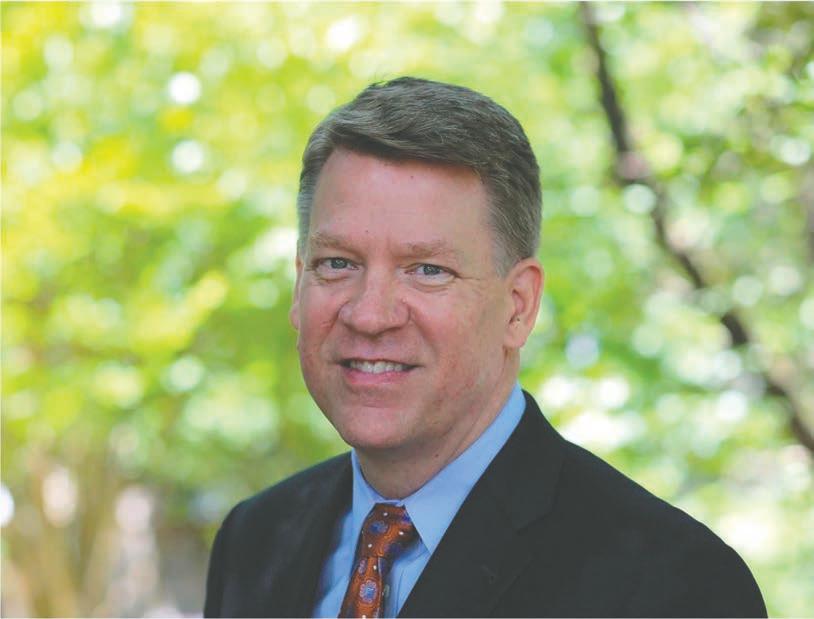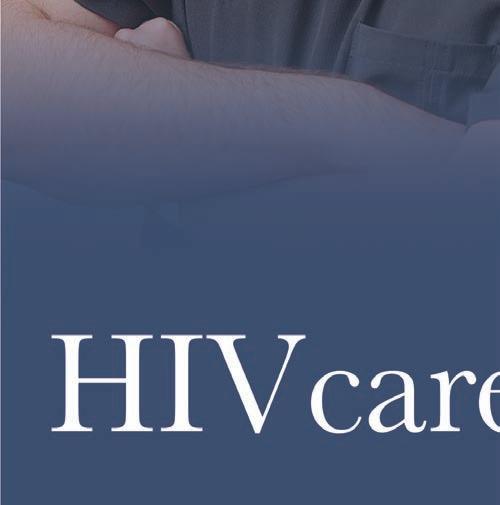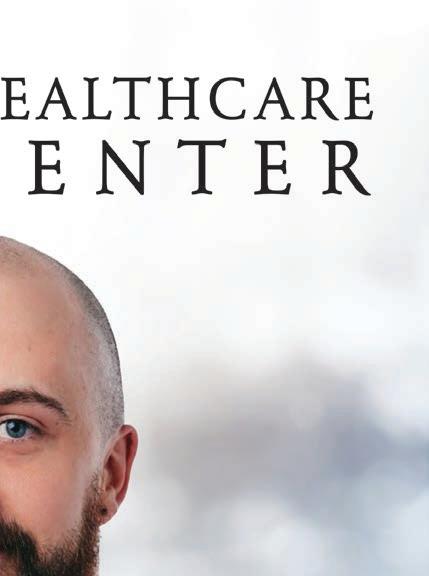



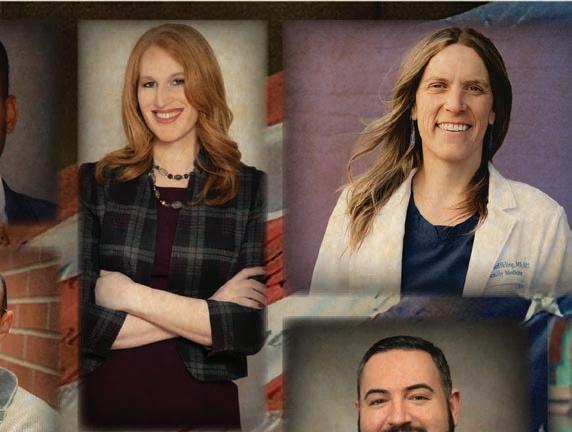
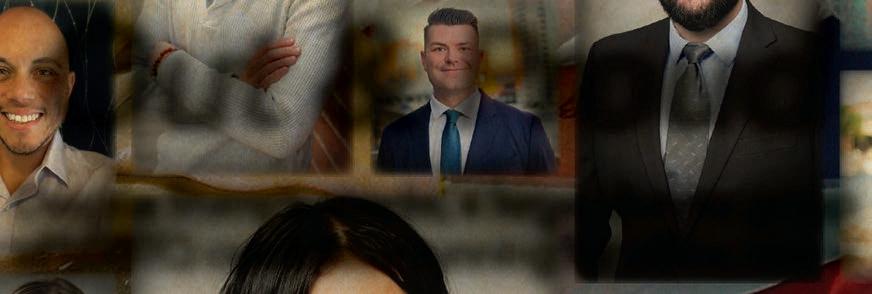







Despite Trump’s attacks, a large, diverse group of LGBTQ candidates running for office, PAGE 14
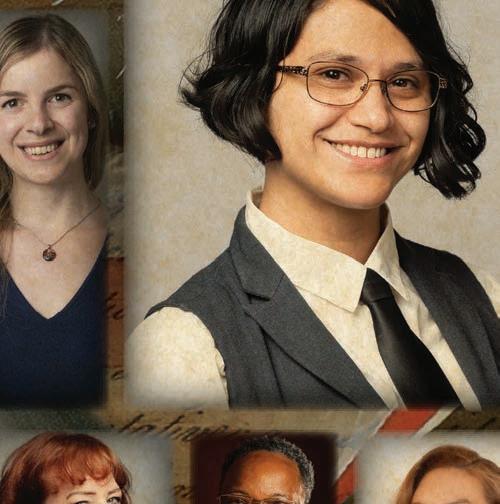




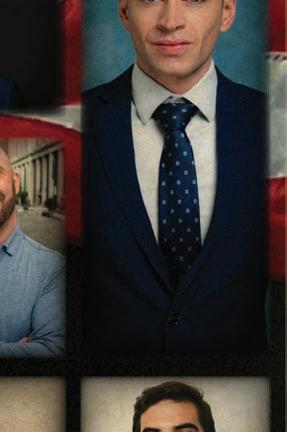



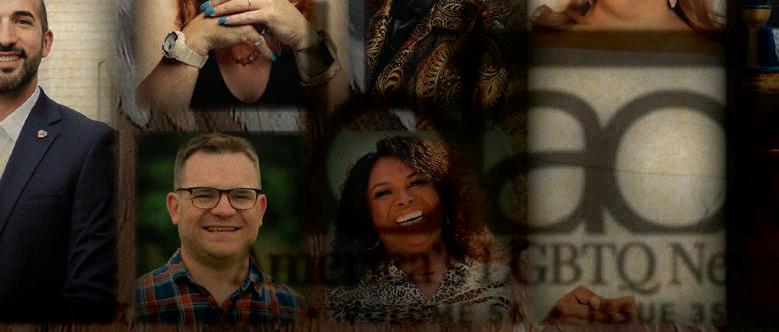
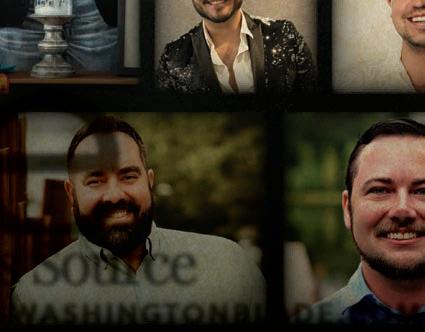










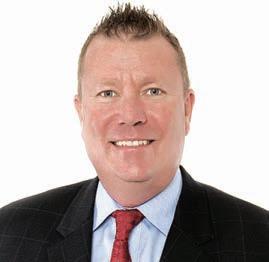










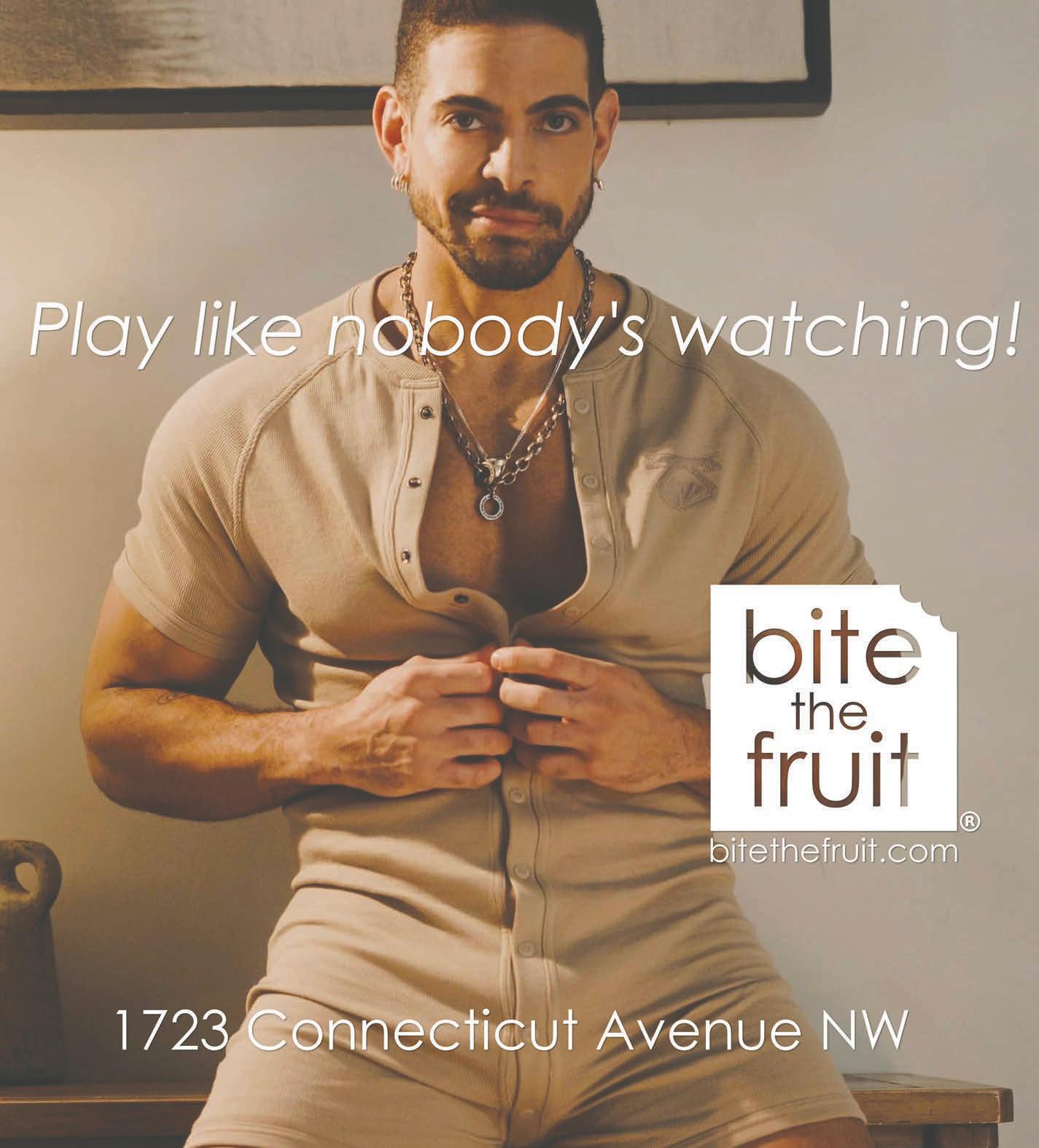











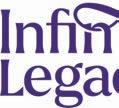












ADDRESS PO Box 60664
Washington DC 20039
PHONE
202-747-2077
news@washblade.com
INTERNET
washingtonblade.com
PUBLISHED BY Brown Naff Pitts Omnimedia, Inc.
PUBLISHER
LYNNE J. BROWN
lbrown@washblade.com ext. 8075
EDITORIAL
EDITOR
KEVIN NAFF
knaff@washblade.com ext. 8088
SR. NEWS REPORTER
LOU CHIBBARO JR. lchibbaro@washblade.com ext. 8079
WHITE HOUSE CORRESPONDENT
CHRIS KANE
ckane@washblade.com extg 8083
INTERNATIONAL NEWS EDITOR
MICHAEL K. LAVERS
mlavers@washblade.com ext. 8093
LOCAL NEWS REPORTER
JOE REBERKENNY
jreberkenny@washblade.com ext. 9463
POP CULTURE REPORTER
JOHN PAUL KING
PHOTO EDITOR
MICHAEL KEY mkey@washblade.com ext 8084
CONTRIBUTING WRITERS
DANIEL ITAI, ISAAC AMEND, TINASHE CHINGARANDE, PETER ROSENSTEIN, PATRICK FOLLIARD, TERRI SCHLICHENMEYER, JOE PHILLIPS, EVAN CAPLAN, ANKUSH KUMAR, ESTEBAN RIOSECO, SAM KISIKA, ELVIS KAWEDO, JAKE STEWART, HENRY CARNELL, DAWN ENNIS
CREATIVE DESIGN/PRODUCTION
MEAGHAN JUBA
production@azercreative.com
SALES & ADMINISTRATION
DIRECTOR OF SALES & MARKETING
STEPHEN RUTGERS
srutgers@washblade.com ext. 8077
SR. ACCT. EXECUTIVE
BRIAN PITTS
bpitts@washblade.com ext. 8089
CLASSIFIED ADVERTISING/ADMINISTRATION
PHILLIP G. ROCKSTROH
prockstroh@washblade.com ext. 8092
NATIONAL ADVERTISING
RIVENDELL MEDIA
212-242-6863; sales@rivendellmedia.com
For distribution, contact Lynne Brown at 202-747-2077,












A group of customers reported an anti-LGBTQ attack in York, Pa., on Friday, Aug. 22, according to the York Daily Record.

(Photo by Zeferli/Bigstock)
York City Police Commissioner Michael Muldrow said he ordered detectives to investigate the incident in which a group of LGBTQ individuals said they were harassed and attacked near the York County Judicial Center by another group they first encountered at Gift Horse Brewing Company, YDR reported.
Brady Pappas, one of the alleged victims, shared a Facebook post about the incident. He wrote that he and two friends were harassed by several patrons in an outdoor beer garden “screaming at us and calling us faggots.”
Pappas and the group then left the bar.
“The group then ran out of the bar, across traffic, and circled us on the sidewalk, saying things like ‘If you wanna dress like women act like women.’ They were threatening us and getting in our faces for a few minutes while staff and some bystanders were watching from across the street,” Pappas wrote.
“After exchanging yells from down the street, the group, led by one of the men began running after us and attacked Vayne,” Pappas wrote. “Vayne was in no way being physically aggressive and said multiple times that they did not want to fight. The guy did not stop trying to get to Vayne and once he did, began to push Vayne, grab them, and punch them while trying to get Vayne into a chokehold. Vayne swung their book bag at him trying to put some distance between them, but fell over a bench, in which the guy then threw Vayne to the ground and choked them to the point that they turned purple, passed out, and began seizing after coming back to consciousness about 5 seconds later. Tragedy and I were trying everything we could to help. I truly did not know what was going to happen to my sister as I was sobbing, trying to pull them off of Vayne, begging for them to stop.”
“An employee from Gift Horse got the man off of Vayne and held him down until the police arrived,” Pappas continued. “I’m so grateful for the witnesses who came to our aid, and consoled us. They were queer and ally community members who actually knew us.”
“The interactions with the cops were disappointing as they dismissed everything that we said,” Pappas wrote.
Pappas added that police charged both Vayne and a man with disorderly conduct in the incident.
“This was hate,” Pappas wrote. “Vayne never laid a hand on the guy until they had to defend themselves.”
Commissioner Muldrow responded in a Facebook post: “ANY incident where ‘Hate Fueled Violence’ is alleged (in this community) will ALWAYS be a priority to myself, this Department, and York City Government as a whole.
“To that end, after consulting with Downtown Inc. Leadership (who were on top of this incident from the start, advocating for the Victims and the safety of the Downtown Community);
“(1) I’ve ordered our Detectives back in (today) to do a thorough ‘review of the case’ (i.e.; meeting with responding Officers, studying available surveillance video, speaking to victims, witnesses and persons involved as needed, reviewing the circumstances, and consulting with the DA’s Office to make sure the most appropriate charges are filed)...
“(2) Notified the Human Relations Commission about the incident, and
“(3) Deployed our departments new “Trauma Responder” Counselor (to follow-up with the individuals affected during this incident, to help them safely process through what occurred).”
YDR reported that York City Police Capt. Daniel Lentz said that charging documents in the incident are not yet available.
The Arlington School Board held its regularly scheduled public meeting on Aug. 22 at Syphax Education Center in Arlington.
The board celebrated the hiring of teachers and the start of the school year. However, the normal business of the local elected body was overshadowed by the presence of the Republican gubernatorial candidate and current lieutenant governor of Virginia, Winsome Earle-Sears. She came to the meeting to admonish the board for its affirming policies for trans and gender nonconforming students.
A rally in support of the Arlington School Board’s LGBTQ-inclusive policies was held outside of the building before the meeting and was attended by Arlington public officials and scores of community activists. The rally was organized by Equality Arlington and the Arlington Gender Identity Alliance.
The transgender-inclusive policies of Arlington County Schools are currently under fire by the U.S. Department of Education.
“The Department of Education made a demand on five Northern Virginia school systems — including Arlington County — to not only cease all current policies that protect the rights and dignity of transgender and nonbinary students, but to remove the concept of gender identity from policy entirely,” Equality Arlington Vice President Samantha Perez explained.
“Last week, all five of these school systems — Arlington included — told the Department of Education that they would not be complying with this order,” Perez continued. “We’re here to thank the Arlington Public School System for standing up to the bullies in the Trump administration and in the Department of Education.”
Other speakers at the rally included Arlington County Board members Maureen Coffey and Julius “JD” Spain, Sr., as
well as Commonwealth’s Attorney for Arlington County, Parisa Dehghani-Tafti. Approximately 100 people attended the rally in support of the school board. There was also a smaller group of supporters of Earle-Sears, holding “Parents for Winsome” signs, standing to the side.
Several speakers at the rally mentioned the anticipated appearance of Earle-Sears at the local school board meeting.
“Some have said that this is like a political stunt. And quite honestly, that is what it is,” Spain mused. “Our kids are preparing to go to school on Aug. 25 — next Monday — when they should be finalizing the joy of the summer … And guess what? We’ve got people coming into Arlington’s back yard, want to make a political stunt, want to make national news to gain some edge.”
“Well, let me tell you something, let me give you some late breaking news: It is not going to happen in Arlington. Wrong City, wrong county, try again.”
Dehghani-Tafti said, “I understand that the lieutenant governor is here. And my message to her is this: If you break the law in Arlington, you will be held accountable, no matter your identity, as we are doing in our current prosecution. But we in Arlington: what we do not do … what we will not do … is treat kids like criminals when all they want to do is just go to school.”
“The laws of the commonwealth of Virginia and of our federal government support Arlington Public Schools making this decision and making it for our kids here in Arlington,” said Coffey. “And so while our school board members are actually physically inside right now, meeting with their attorneys, figuring out how we are going to navigate this situation, they wish they could be preparing for the start of school on Monday, as they should be focused on today … instead, they are dealing with the media circus that has been created by people who are not from our community and who do not
care about our kids.”
Following the speeches, activists from both sides of the debate entered the Arlington School Board meeting room, with some signing up to speak in the public comment period. Members of the community were allowed two minutes per person to speak on a topic relevant to the Arlington School Board. The majority of speakers at the meeting on Thursday were on the topic of Arlington County School’s trans-inclusive policies.
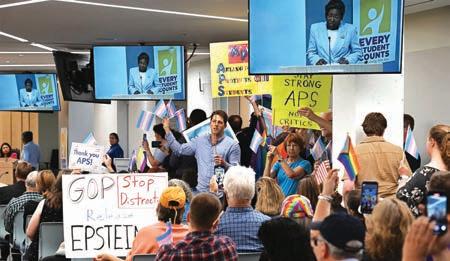
Virginia Lt. Gov. Winsome Earle-Sears speaks during the public comment period of the Arlington School Board meeting on Thursday, Aug. 21. (Washington Blade photo by Michael Key)
Arlington Public Schools Superintendent Francisco Durán issued a statement before the public comment period began.
“On Friday, APS and other local school divisions responded to a request from the U.S. Department of Education regarding our transgender student policy,” Durán said. “We strongly disagree with the department’s assertion that our policy violates Title IX.”
MICHAEL KEY











In-Stock TRAFTON LEATHER SOFA $1399
Buy as shown in leather with vinyl match; matching chair $879 . Customize your look by choosing from a wide selection of fabrics and leather; wood or metal leg option. Sofa in fabric from $1099 . Sectional also available. H Made in the USA.


‘We’re not just a soccer club, we’re building a culture of belonging,’ CEO says
By JOSEPH REBERKENNY | jreberkenny@washblade.com
Washington, D.C. is a major sports town. From the Nationals to the Capitals, basketball to tennis, if you want to watch professional sports, D.C. has some of the best around.
One team that has scored big in recent years – especially among the LGBTQ community – is the Washington Spirit, the DMV’s professional women’s soccer team. From last year’s record-breaking season, all-star athletes, and commitment to uplifting LGBTQ youth in D.C. with donations to local organizations like SMYAL, the Spirit is infectious.
Last year was a big year for the team for another reason as well: For the first time in the team’s history, the Spirit announced it would have its first CEO, Kim Stone. For more than 30 years, Stone has held many roles across the country in making good sports venues great. Most recently, she was president of UBS Arena in Elmont, N.Y. (home of the New York Islanders), a crucial member of business operations for the Miami HEAT, and part of the team at the Chase Center in San Francisco.
With such an accomplished past, it should come as no surprise that even with just a year under her belt, she has helped make the Spirit “one of the most successful NWSL clubs” in many ways – most notably by “expanding revenue, partnerships, staff,” and arguably the most important way – growing the fanbase.
One way Stone and the entire Spirit team have been able to grow the fanbase – like breaking the record for attendance at their home of Audi Field – has been through partnerships and themed games. On Sunday, Aug. 31, the Spirit will take on the Chicago Stars Football Club for one of the most anticipated games of the year – the annual Pride match.
The Spirit has had multiple out players in recent years including current midfielder Leicy Santos and, from 2021 to 2024, defender Anna Heilferty. In addition to having a history of star queer players that make the Pride game extra special, the purchase of a specialty Pride ticket will grant Spirit Squadron members (aka the Spirit fanbase) a free Washington Spirit Pride fanny pack, complete with a classic rainbow Pride flag strap and the logo in the colors of the progressive Pride flag.
And, just like last year, there is a long lineup of spectacular and spiritful drag talent: Shi-Queeta-Lee, Delila B. Lee, Bootsy Omega, Capri Bloomingdale, Kabuki B. Lee, and D.C. drag legends including Tula, Twix, and Citrine the Queen. One new thing about this year’s Pride game is the inclusion of popular DMV LGBTQ influencer QueerTalkDC, who has been promoting the game and will be posting about it to her more than 28k followers.
In honor of the upcoming Pride game, the Spirit recently donated $10,000 to SMYAL to support their scholarship program, helping LGBTQ+ students take the next step in their educational and career journeys. SMYAL’s scholarships recognize outstanding and unapologetic LGBTQ+ student leaders who have demonstrated personal growth and a commitment to creating positive change in their schools or communities, reflecting the same spirit of inclusion and em -
powerment that the team celebrates on the field.
In anticipation of the game, the Washington Blade sat down with Stone to discuss what it means to be the team’s first CEO, why the Pride match is especially meaningful to her as a proud lesbian, and how the team’s talent for fostering all types of community at Audi Field is important to creating a great fanbase.
When asked how she found the club’s atmosphere, Stone was quick to point out it was more than just about watching women play top-tier soccer – it’s about fostering community.
“We’re not just a soccer club, we’re building a culture of belonging, where every fan, every player, every staff member knows they’re valued,” Stone said, explaining that to create it she – and the team as a whole – work toward making this a place for everyone. “Inclusion doesn’t just happen by accident—it’s something we lead with every day. You either have culture by design, or you have culture by default, and we’re intentional about creating a Spirit family where everyone belongs.”

Stone explained that it must start from the top down – and recognized it begins with her leading and living authentically as a gay executive in a traditionally male-dominated field.
“I don’t lead despite being gay—I lead authentically because of it, and because visibility matters,” she said. “Having a community of fans that embraces everyone is so important, and I want to make sure that when people come to our matches, they feel welcomed, celebrated, and seen.”
That success in living authentically has helped her inside the industry as well. She explained that by becoming more comfortable discussing her relationship with her wife, Karla Jones Stone, even just around the water cooler, has helped make her a better CEO and leader.
“Being open about my lifestyle has helped me be a better leader. It’s brought me more joy and allowed me to lead authentically. When I first came out in Miami, I no longer had to hide who I was or call my wife my ‘best friend.’ That ability to live openly made all the difference—not just personally, but professionally too.”
That radical acceptance, which many in the LGBTQ
community strive for, is exactly what makes this themed game so special, Stone explained. The simplicity of feeling not only represented but also celebrated while enjoying something as community-building as sports – which can often be daunting to get into as a queer person – is why the team holds these specialty theme nights.
“Hosting a Pride match is a celebration of my community, where I belong and where I find a sense of inclusion. For two and a half hours, we can help people have fun, feel safe, and just be who they are without judgment. That’s what makes Pride Night so powerful.”
While the Pride game is a chance to uplift LGBTQ members of the “Spirit Squadron,” the energy Stone and the whole team hope to exude is one of welcoming for all – regardless of race, gender identity, sexuality, or background.
“Everybody is welcome, and there’s a real sense of belonging. For especially our gay community, the Spirit can be a safe place to come together, laugh, have fun, and celebrate who we are.”
She went on to explain that when she first looked into joining the Spirit as a member of the business operations team, what sold her was the vibrancy of the fans.
“When I first came to a Spirit match, I looked around and saw the diversity of the crowd and thought, ‘Oh boy, we can really work with this.’”
And the Spirit’s celebration of identity doesn’t stop with the LGBTQ community at the Pride game either. On Sept. 28, the Spirit will celebrate Hispanic Heritage with “entertainment and activations” that will highlight the diversity, cultural heritage, and contributions of the Hispanic community in the DMV and across soccer.
Stone went on to explain that providing a platform for people to watch others perform at the highest caliber—like the Spirit has done—can be tremendous for creating and supporting self-worth.
“Once you see it, you can be it. Whether it’s little girls wanting to emulate our players, or gay people wanting to see elite athletes at their best—representation matters. When people can see themselves reflected in leadership and on the field, they know it’s possible for them, too.”
That representation has also fueled an undeniable connection between the team and its fans, one that continues to grow with every season.
“I’m so impressed with the DMV’s love of this team. We pack Audi Field to the point we now call it ‘Rowdy Audi’—our fans do such a great job supporting us. It’s unlike anything else I’ve experienced in sports, and it makes me proud to be part of this community.”
For Stone, the power of the Spirit isn’t just about wins and losses—it’s about what the game itself can represent.
“Sports is the great unifier. People can come together at a match and leave their political affiliations and biases at the door. That’s why these moments of celebration—like Pride Night—matter so much. It’s about being together, cheering, and feeling part of something bigger than yourself.”
Tickets are available at washingtonspirit.com.


By CLINTON ENGELBERGER
Dana Piccoli tried everything to lose weight.
She frequented the gym, went on and off diets and hired a personal trainer. When Piccoli decided to get on a GLP-1, it wasn’t a “ short cut” to drop weight – it was a way for her to live her life comfortably.
“ When I told someone I was on it, they were like, ‘I’m going to the gym because I want to do it the right way,’” said Piccoli, managing director of queer media collaborative News is Out. “ Obviously that kind of stung because for me, this is the right way.”
GLP-1 drugs have caused quite a stir since becoming more integrated into mainstream medicine. The newness of some brands, like Ozempic, have led to stigmas and mistrust surrounding them. These stigmas disproportionately affect the LGBTQ+ community since queer people are more subject to body dissatisfaction and have more trouble finding accessible healthcare.
Through all the noise, however, experts say taking GLP-1s are safe with the right counseling, and LGBTQ+ people could largely benefit from them.
So, what’s all the ruckus about? Are GLP-1s an “easy way out” to lose weight? And how do they really impact the LGBTQ+ community?
How GLP-1s work
GLP-1s, or glucagon-like peptide-1, mimic the actions of a GLP-1 that is released by the gut after eating. It can help people with Type-2 diabetes by lowering blood sugar through the release of insulin, and can help those with obesity by slowing down digestion and, in turn, reducing one’s appetite.
Like any medication, there are some side effects to consider. Sangeeta Kashyap, assistant chief of clinical affairs at Weill Cornell Medicine, said symptoms like nausea, diarrhea, and vomiting can occur. However, Kashyap said these side effects are less severe than past GLP-1 brands – a reason that contributes to their newfound popularity – and can be better managed with proper guidance.
Since the drug causes a loss of both fat and muscle loss, she said doctors should inform patients to do strength training to maintain any deteriorating muscle, and to eat high-protein diets, since fatty foods increase the risk of vomiting or nausea.
Getting on a GLP-1 isn’t just about shedding a few pounds. Kashyap said it’s a commitment to your health and body, which is why talking with a doctor and understanding the risks are crucial.
“ We give patients appropriate guidelines,” Kashyap said. “ We do blood tests, we monitor things, and give a lot of counseling to these patients. I don’t think you could just give the medicine out like candy.”
Piccoli, who started her GLP-1 journey with her wife, said the medication helped turn off “ food noise.”
“ Your motivation for things, your reward system with food is kind of disabled,” Piccoli said. “ That really helped me understand my relationship with food.”
Losing weight isn’t as easy as getting on a GLP-1 and eating less. Piccoli said turning off the food noise in her brain led to a complete lifestyle shift.
“ I had to completely change everything about the way I eat, everything about the way I approach food,” she said about her experience taking Mounjaro. “ This has been one of the hardest things I’ve ever done.”
Kashyap said the lifestyle change that comes with taking a GLP-1 is why it ’s important to consult a doctor first to understand how it could affect you not just physically, but also emotionally.
Kashyap said she sees higher rates of mental health disorders in transgender women, a community that already faces more barriers in finding accessible healthcare.
This could lead to someone getting on the drug for the wrong reasons, Kashyap said. She noted that those with eating disorders or body dysmorphia could face more severe side effects. Body dysmorphia and body image concerns are already an issue for the LGBTQ+ community, Kashyap said, so prescribing GLP1s needs to be handled with care.
One way to ethically prescribe a GLP-1 to a patient would be to conduct a mental health screening, according to Kashyap. Mental health screenings aren’t
required to get on a GLP-1, but Kashyap said they would be beneficial to patients who may be prone to negative effects by taking the drug.
Although some people may see more severe side effects, Caroline Apovian, co-director of the Center for Weight Management and Wellness at Brigham and Women’s Hospital, said GLP-1s are a completely safe and rigorously tested drug.
If a person faces negative side effects from taking a GLP-1, it’s more about how their body or brain is reacting to it than the drug itself being unsafe.
“Any kind of weight loss is going to affect your mood, either positively or negatively,” Apovian said.
With the queer community already facing increased barriers to healthcare, there’s another issue to consider: GLP-1s aren’t cheap.
Depending on where you get it from and whether or not insurance covers it, you could pay hundreds or even thousands of dollars for a limited supply.
Piccoli said she paid out of pocket and had to make sacrifices for her and her wife to both get on a GLP-1.
“ I didn’t renew my car lease,” Piccoli said. “ We decided to go down to one car so that we had some extra income monthly to be able to pay for it.”
On the other hand, Matt, who requested to be identified only by his first name due to the sensitivity of the topic, said he was shocked at how easy it was to get the cost of his GLP-1 covered by insurance. He had been warned by his doctor about the difficulty of getting it covered, and expected an “ uphill battle.”
“ [My doctor] wrote out the prescription for me, and on my way home, I got a text message from the drugstore saying it was ready to go,” said Matt, who’s lost 48 pounds on Ozempic since June 2024.
Matt said experiences like his, although not the standard, are why it’s important to talk with your doctor about getting on a GLP-1 and see for yourself rather than taking advice from social media stigmas.
Kashyap said the drug is also becoming more accessible through websites like Lilly, which provide vials for about $300-500. While that isn’t pocket change, it’s significantly cheaper than retail pharmacies.

You may have to make sacrifices like Piccoli did, but getting access to modern GLP-1s for weight loss isn’t only for the Hollywood elites like it seemed to be a few years ago.
Through all the social stigmas and uncertainty, Kashyap and Apovian agreed that GLP-1s are a major benefit for the queer community.
Trans women have increased rates of obesity, Type-2 diabetes and metabolic syndrome, according to Kashyap. Estrogen treatments increase fat mass and insulin resistance, leading to higher obesity rates in trans women. Kashyap said GLP-1s could be helpful in mitigating those effects.
GLP-1s also reduce alcohol cravings, so Kashyap noted that anyone struggling with alcoholism may see improvements with that condition upon getting on the drug.
Getting on a GLP-1 isn’t the walk in the park some may make you believe it is – it’s a lifestyle change and health commitment.
But it’s also a change that can provide good and healthy results if you seek the appropriate guidance from a professional.
While social stigmas in the queer community may lead to misinformation on who should use it and what it should be used for, GLP-1s are safe and can be a much-needed relief for a community facing significant healthcare obstacles.
This is only a brief summary of important information about BIKTARVY® and does not replace talking to your healthcare provider about your condition and your treatment.
BIKTARVY may cause serious side e ects, including:
Worsening of hepatitis B (HBV) infection. Your healthcare provider will test you for HBV. If you have both HIV-1 and HBV, your HBV may suddenly get worse if you stop taking BIKTARVY. Do not stop taking BIKTARVY without fi rst talking to your healthcare provider, as they will need to check your health regularly for several months, and may give you HBV medicine.
BIKTARVY is a complete, 1-pill, once-a-day prescription medicine used to treat HIV-1 in adults and children who weigh at least 55 pounds. It can either be used in people who have never taken HIV-1 medicines before, or people who are replacing their current HIV-1 medicines and whose healthcare provider determines they meet certain requirements.
BIKTARVY does not cure HIV-1 or AIDS. HIV-1 is the virus that causes AIDS.
Do NOT take BIKTARVY if you also take a medicine that contains:
dofetilide
rifampin
any other medicines to treat HIV-1
BEFORE TAKING BIKTARVY
Tell your healthcare provider if you:
Have or have had any kidney or liver problems, including hepatitis infection.
Have any other health problems.
Are pregnant or plan to become pregnant. Tell your healthcare provider if you become pregnant while taking BIKTARVY.
Are breastfeeding (nursing) or plan to breastfeed. Talk to your healthcare provider about the risks of breastfeeding during treatment with BIKTARVY.
Tell your healthcare provider about all the medicines you take:
Keep a list that includes all prescription and over-the-counter medicines, antacids, laxatives, vitamins, and herbal supplements, and show it to your healthcare provider and pharmacist.
BIKTARVY and other medicines may a ect each other. Ask your healthcare provider and pharmacist about medicines that interact with BIKTARVY, and ask if it is safe to take BIKTARVY with all your other medicines.
BIKTARVY may cause serious side e ects, including:
Those in the “Most Important Information About BIKTARVY” section.
Changes in your immune system. Your immune system may get stronger and begin to fight infections that may have been hidden in your body. Tell your healthcare provider if you have any new symptoms after you start taking BIKTARVY.
Kidney problems, including kidney failure. Your healthcare provider should do blood and urine tests to check your kidneys. If you develop new or worse kidney problems, they may tell you to stop taking BIKTARVY.

Too much lactic acid in your blood (lactic acidosis), which is a serious but rare medical emergency that can lead to death. Tell your healthcare provider right away if you get these symptoms: weakness or being more tired than usual, unusual muscle pain, being short of breath or fast breathing, stomach pain with nausea and vomiting, cold or blue hands and feet, feel dizzy or lightheaded, or a fast or abnormal heartbeat.
Severe liver problems, which in rare cases can lead to death. Tell your healthcare provider right away if you get these symptoms: skin or the white part of your eyes turns yellow, dark “tea-colored” urine, light-colored stools, loss of appetite for several days or longer, nausea, or stomach-area pain.
The most common side e ects of BIKTARVY in clinical studies were diarrhea (6%), nausea (6%), and headache (5%).
These are not all the possible side e ects of BIKTARVY. Tell your healthcare provider right away if you have any new symptoms while taking BIKTARVY.
You are encouraged to report negative side e ects of prescription drugs to the FDA. Visit www.FDA.gov/medwatch or call 1-800-FDA-1088.
Your healthcare provider will need to do tests to monitor your health before and during treatment with BIKTARVY.
Take BIKTARVY 1 time each day with or without food.
This is only a brief summary of important information about BIKTARVY. Talk to your healthcare provider or pharmacist to learn more.
Go to BIKTARVY.com or call 1-800-GILEAD-5.
If you need help paying for your medicine, visit BIKTARVY.com for program information.



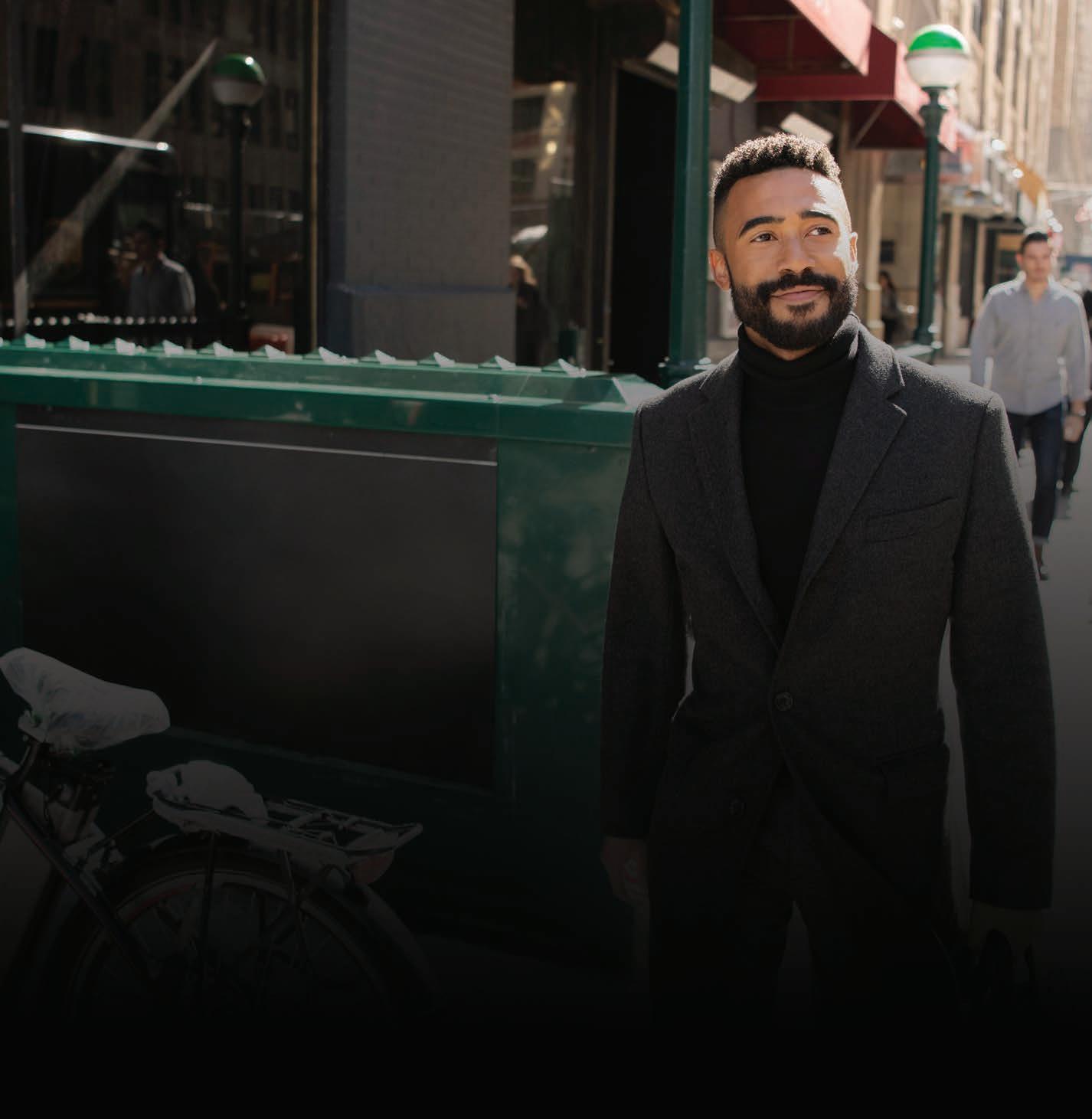









By CHRISTOPHER KANE | ckane@washblade.com
When the LGBTQ+ Victory Institute convenes its flagship Candidate and Campaign Training in Los Angeles next month, the agenda will be familiar: four days of workshops, mock campaign plans, and late-night study sessions as aspiring politicians learn the ins and outs of running for office.
For the first time, however, this year transgender, nonbinary, and gender-nonconforming candidates will stay in town after the larger group disperses for a two-day extension designed specifically for them.
A collaboration between Victory and Advocates for Trans Equality, the program comes at a pivotal time of ascendant transphobia at the White House, in the Trump-Vance administration more broadly, and across the country as state legislatures have advanced anti-trans bills at a breakneck pace in 2025.
Organizers say the training is meant to build a pipeline — not just of candidates, but of resilient leaders who are prepared for campaigns fought in an era of anti-LGBTQ politics, and polarization fueled or accelerated by online platforms.
Among those voices is Alexis Hoffkling, a family physician in Colorado who decided last year that her lane of impact needed to expand.
“I’ve cared about politics my whole life, in a not particularly involved kind of way that, in retrospect, is sort of like sitting in the stadium of a sporting event and not being on the field,” she told the Washington Blade during an interview last week.
“For a really long time, I’ve been operating in the mode that the best way to make a positive change in the world is to pick something and do it really well. And for me, that was providing medical care and teaching the next generation of doctors to be good doctors without losing their humanity.”
That work, she added, comes with a political education of its own. “You can’t provide safety net primary care with an open mind and an open heart without being a little radicalized by it.”
What pushed her to run, she said, was not any single policy change but a deeper recognition of the stakes.
“It became really clear that this is not a business-as-usual kind of moment in history,” Hoffkling said. “I just woke up one morning and said, ‘OK, I have to be able to say, in 20 years, if I haven’t been disappeared, that I did everything I could when history called for it.’ And I’m convinced that this is the way to do that. Never mind work-life balance.”
Hoffkling brings the daily realities of her patients with her into the political arena.
“Every day is full of stories,” she said. “My patients are wonderful and resilient and thoughtful people whose life stories really clearly demonstrate the consequences of policy decisions.”
The most immediate threat, she argued, is the federal government’s push to cut Medicaid.
“People are going to die. Many, many people are going to die,” she said. “And many more people are going to have their lives devastated by the costs of care, directly and indirectly. Communities are going to suffer. Rural hospitals are going to close, and they’re not going to reopen after they close.”
She worries, too, about the erosion of scientific authority and the exodus of biomedical research talent abroad. “Conceivably, we could restore Medicaid funding. We could even do something more than restore it. But it’s going to take a lot of work to rebuild trust in public institutions when they are being used in a corrupt, anti-scientific and persecutory fashion.”
On gender-affirming care, she is unequivocal: “This is healthcare. This is medical care. In the same way that the government shouldn’t be determining whether or not you take antibiotics or have surgery for your appendicitis, it should be a conversation between you and your doctors,” she said. “Government should stay out of it, and where the federal government is trying to muck around in it, then it is our job as states that care about human rights to do everything we can to protect the sanctity of the doctor-patient decision making space.”
When Virginia State Sen. Danica Roem unseated a 26-year Republican incumbent in Virginia in 2017, she became the first out transgender state legislator in the country. Since then, she has turned her experience into a roadmap for others — including through her book “Burn the Page” and now through the trans and gender diverse training extension she will help lead in Los Angeles.
“What is life like as a trans person on the campaign trail? What is your day to day?” Roem said of the sessions she plans to run. “Because you know that your gender will be the headline of the story. No matter whether you’re running for soil and water conservation district or you’re running for Congress, your gender is going to be the first thing that’s going to be mentioned about you.”
The key, she tells trainees, is not to deny the reality but to control how much it defines the narrative.

“You never say, ‘I’m trans, but.’ I say, ‘I’m trans, and.’ I’m not apologizing for who I am,” Roem said. “I’m trans, and I care a lot about fixing Route 28. About universal free school breakfast and lunch. About making Virginia a more inclusive commonwealth.”
That approach, she noted, has already helped other trans candidates win. “Emma Curtis followed my playbook pretty much verbatim, and now she’s a member of the Lexington City Council,” Roem said.
For Hoffkling, the appeal of the training is partly practical — fundraising, budgeting, social media — and partly about the blind spots she may not yet know she has.
“The unknown unknowns, those are your blind spots,” she said. “Those are the danger points, and it’s worth spending time and energy to try to map those out so that they’re no longer blind spots.”
But just as important is the chance to learn from others who have been targeted because of their gender identity.
“Most of the challenges of campaigning are universal to any candidate, but some of them will be specific to the experience of navigating a campaign in a transphobic world while trans,” she said. “I want to learn more from the experience and insights of other folks who walk this path.”
Roem, who has trained dozens of candidates through Victory and Emerge Virginia, which works to elect women to public office, said those moments of connection are often the most powerful.
“The most important thing that I did in the Chicago training last year was spend one-onone time with dozens of them,” she said. “Because then if I can connect with someone as a person, I can usually fish out something beyond the slogan of why you’re running for office. The slogan is nice, the policy position is important. [But] why are you really running? Tell me who you really are.”
Those conversations, she said, often bring candidates to tears. But they also bring breakthroughs that can prepare candidates to “really become unstoppable on the campaign trail.”
Hoffkling frames representation itself as a form of medicine.
“When I have a patient who has a trans kid who comes to her appointments, who is so excited to come to her mom’s doctor’s appointments because there’s a trans doctor — that’s one little snapshot of a moment in an exam room that’s private,” she said. “But that same phenomenon happens at scale, and in a public role in public office, it helps people to see the expanse of possibilities for their future.”
She credits trailblazers like Roem, U.S. Rep. Sarah McBride (D-Del.), and Colorado State Rep. Brianna Titone with clearing the way. “If there weren’t the wave of Sarah McBride, Brianna Titone, Danica Roem, Zooey Zephyr…then in my race, I would be facing a lot of questions about, ‘is it possible? Is it winnable, as a trans person?’ And the fact that other people have proved that it’s possible makes it more possible for me.”

A published report indicates the Trump-Vance administration plans to not fully fund PEPFAR in the upcoming fiscal year.
The New York Times on Aug. 21 reported the Office of Management and Budget that Russell Vought directs “has apportioned” only $2.9 billion of $6 billion that Congress set aside for PEPFAR for fiscal year 2025. (PEPFAR in the coming fiscal year will use funds allocated in fiscal year 2024.)
“They are withholding FY25 funds appropriated by Congress, so that FY26 means PEPFAR shrinks away to nothing,” Health GAP Executive Director Asia Russell noted to the Washington Blade.
Then-President George W. Bush in 2003 signed legislation that created PEPFAR. UNAIDS Executive Director Winnie Byanyima in March told reporters during a Geneva press conference that PEPFAR has saved 26 million lives.
The Trump-Vance administration in January froze nearly all U.S. foreign aid spending for at least 90 days. Secretary of State Marco Rubio later issued a waiver that allows PEPFAR and other “life-saving humanitarian assistance” programs to continue to operate during the freeze.
The New York Times notes bipartisan opposition in the U.S. Senate prompted the Trump-Vance administration last month withdraw a proposal to cut $400 million from PEPFAR’s budget.
The Blade has previously reported PEPFAR-funded programs in Kenya and other African countries have been forced to suspend services and even shut down because of gaps in U.S. funding.
“As part of the administration’s effort to end diversity, equity and inclusion programs, it has terminated HIV care for gay and transgender people,” notes the New York Times. “HIV prevention programs for
high-risk groups — such as sex workers and injecting drug users — have been cut and only pregnant and breastfeeding women can now receive U.S.-funded prevention drugs or condoms.”
NEPHAK is a network of Kenyan HIV/AIDS service organizations.
Nelson Otwoma, the group’s director, on Tuesday noted to the Blade the U.S. funding gaps have forced NEPHAK to lay off health care providers and close drop-in centers that serve key populations that include transgender people, gay men, and men who have sex with men.
“The Kenya government is integrating HIV care into general health service centers,” noted Otwoma. “With criminalized and highly stigmatized communities, this is huge barrier to access to services. Besides, there are concerns around privacy, confidentiality, and consent [and] worse because (untrained) health care workers also come with negative attitude towards (key populations) and people with HIV.”
Kenya is among the countries in which consensual same-sex sexual relations remain criminalized.
Otwoma said NEPHAK has also “had to halt” its Community Led Project that the Centers for Disease Control and Prevention funded through UNAIDS. Otwoma also told the Blade that NEPHAK had to lay off staff and go into debt because the CDC-funded project “was classified as surveillance, which was not under the limited waiver” that Rubio issued.
“At the national programming level, NEPHAK members receive life-long treatment from the U.S. government through PEPFAR,” he said.
Otwoma noted PEPFAR or the Global Fund pay for HIV treatments in Kenya — and he pointed out more than 30 percent of the Global Fund’s funding comes from the U.S.
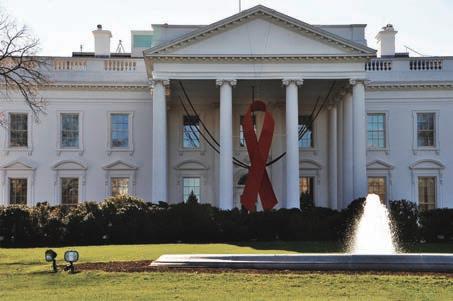
“To deny PEPFAR the support it needs sends the wrong signal to the Kenya PLHIV (people living with HIV) community under NEPHAK,” said Otwoma. “We understand the lives and health of Kenyans is responsibility of the Kenya government but an abrupt transition may not be manageable. Trump should have put in place a responsible transition plan.”
Pasquine Ogunsanya, who directs an HIV program in Uganda, told the New York Times the funds that her organization received this month from the U.S. were only enough to pay staff salaries and cover “ limited administrative costs.” Ogunsanya said she recently learned she would have to cut an additional 40 percent from her group’s budget.
“I’m just thinking how can we do that, I’m having sleepless nights,” she told the New York Times. “How can we have five people providing lifesaving H.I.V. services to 10,000 clients?”
Russell has participated in several protests in D.C. where she and other HIV/AIDS activists have demanded the Trump-Vance administration fully fund PEPFAR. Russell on Tuesday reiterated this demand.
“Congress has to act … it has to exert its will,” said Russell. “Lives are on the line.”
MICHAEL K. LAVERS
In Britain today, no issue illustrates the cruelty of our political culture wars more starkly than the debate over trans rights. What should have been a modest update to outdated legislation has become one of the most poisonous battlegrounds in national life.
As a gay man, I fear this toxicity will not stay confined to the UK. It is a contagion that could easily spread to the United States.
The storm began in Scotland. Former First Minister Nicola Sturgeon sought to reform the Gender Recognition Act, which forces trans people to endure intrusive medical assessments and years of delay before their gender can be legally recognized. Her proposal would have streamlined the process, as already seen in Ireland and Denmark. On the merits, it was humane and uncontroversial. But Sturgeon also wanted a constitutional confrontation with Westminster. By pushing the bill when she did, she knew London would likely block it, framing the dispute as another example of Scotland being denied self-government. All she had to do was wait a year for a national government more
sympathetic to reform, but she wanted the argument. Sturgeon has since admitted her timing was wrong.
Then came the Isla Bryson case. Bryson, a convicted rapist who identified as a woman, was initially placed in a women’s prison. Tabloid newspapers pounced, turning a single extreme case into a weapon against the entire trans community. Instead of debating dignity and equality, opponents of reform could endlessly talk about “a rapist in a women’s jail.” Sturgeon, who knew the Bryson issue was going to come up, struggled to respond, and the debate collapsed into scaremongering.
The fallout was swift. Westminster exercised a rare veto to block the legislation, and when Scotland challenged it, the U.K. Supreme Court sided against Sturgeon. The reforms were dead, and trans people were left as the biggest losers in a constitutional tug-of-war that had never really been about them.
Of course, the court ruling emboldened the anti-trans media. Headlines screamed “men no longer allowed in women’s bathrooms.” The consequenc -
es have been grimly predictable. A close friend of mine, a butch lesbian, has been challenged three times in women-only toilets and now uses disabled facilities just to avoid confrontation. Meanwhile, an architect friend tells me his firm is being asked to design unisex bathrooms, the very people insisting only “women born female” should use women’s toilets are now ending up with unisex for everyone.
By the July 2024 General Election, the atmosphere was toxic. Politicians would be invited onto radio or television to discuss the economy or foreign policy, only to be ambushed with the question: “Can a woman have a penis?” Almost every center-left politician stumbled, further fueling the sense of a national moral crisis.
The damage is immense. Trans people are vilified across talk radio, tabloids, and parliament. Politicians posture about “protecting women” while ignoring that trans women are among the most vulnerable women in society. What should have been a dry legal reform has entrenched a climate of hostility, suspicion, and division.
SIMON HARRIS

is executive director of SMYAL. Since 1984, SMYAL has proudly supported and empowered LGBTQ+ youth in Washington, D.C.
Safety comes from housing, healthcare, education, community
As D.C.’s LGBTQ+ youth center, SMYAL has witnessed firsthand the resilience, brilliance, and struggles of Washington, D.C.’s young people. At SMYAL, we believe in the power of young people and actively work to build a world— and a city— where they thrive.
Yet, the Trump administration’s alarming authoritarian takeover of Washington, D.C., frames young people as criminals rather than as community members deserving of resources and opportunity.
The real emergency facing D.C. isn’t what headlines suggest; the real crisis is the lack of investment in resources that support and uplift the people who live here. One in five D.C. youth face housing insecurity, and more than 21,000 children live below the poverty line, as funding for critical supports, like housing and healthcare, is threatened at a local and national level.
Since 1984, SMYAL has served thousands of young people—reaching 500 so far in 2025— we know the realities they face: housing instability, family rejection, lack of access to mental health care, and the daily weight of systemic inequities.
For queer and trans youth, political threats like the DOJ’s attempt to access trans youths’ medical records and the removal of LGBTQ+ youth 988 crisis line, exacerbate an already growing mental health crisis. The toll is clear: in 2024, 39% of LGBTQ+ young people seriously considered suicide, and 90% said hostile politics harmed their well-being.
Youth are not problems to be fixed; they are voices to be heard, neighbors to be embraced.
When youth are met with trust, community, and resources, they flourish. When they are met with punishment and policing, they falter. Over-criminalization is not the solution; it is a direct line to deeper harm. The outcome will not be compliance; it will be further distrust, disconnection, and defiance.
We cannot claim to support young people only when it is easy or convenient. Our commitment must be all in. Queer and trans youth, Black and Brown youth, undocumented youth, and unhoused youth all deserve to be met with compassion and investment.
Selective support is not support at all. We cannot prescribe solutions from the outside looking in. True safety and belonging are co-created with young people themselves. Too often, systems are designed for youth, not with them. The result is services that miss the mark and policies that do more harm than good.
The federal takeover of Washington, D.C.’s local authority is not about public safety, it is about control. It is a dangerous overreach of power that relies on fear and scapegoating already underresourced communities.
This is not a new strategy. This escalation mirrors historic patterns of authoritarian leaders who point the finger at marginalized communities to stoke fear and consolidate power. These “law and order” policies are simply thinly veiled racist tactics to erase identities and goad communities into compliance.
What we are seeing right now in D.C. is the criminalization of survival. Whether it’s someone sleeping outside, or young people gathering in public spaces, or an undocumented neighbor trying to put food on their table. To punish survival is to tell young people they are undeserving of the most basic human rights: safety, housing, dignity, and belonging. We focus on people as the problem, rather than the broken systems that have failed them.
But we know another truth: safety comes from housing, healthcare, education, and community. It comes from affirming spaces where young people can express themselves without fear. It comes from opportunities to build futures they can believe in.
Imagine a D.C. where every young person is celebrated, resourced, and seen—where investments flow into the community rather than jails and police budgets. SMYAL has long stood with D.C.’s youth, and today, in the face of federal overreach and authoritarian threats, we renew that commitment. We will not be silent while our young people are scapegoated, punished for surviving, or denied their humanity. D.C.’s young people deserve more than survival—they deserve to thrive.
We must choose compassion over criminalization, investment over punishment, and community over fear. This is our home. Our youth are joyful, our voices are powerful, and together we can build the D.C. they deserve.

Consider who has the best chance of winning the general election is a longtime LGBTQ rights and Democratic Party activist. He writes regularly for the Blade.
We live in interesting times where if we in the LGBTQ community are only motivated to vote based on our own interests, we could end up losing.
In most local elections around the country we will most likely lose. That might also apply to women voting only on women’s issues, or Black voters voting only on civil rights issues. Much of that has to do with the felon in the White House, and his sycophants on the far right, attacking so many people, and using so many issues to divide us. They attack DEI, and use ‘woke’ as a dirty word. I venture to say 90% of their voters would not be able to define either. But to the felon’s credit, he is a successful carnival barker, and liar, and it’s working. He has his MAGA cult attacking, and trying to take over local school boards, and city councils. He, and they, attack those who won’t kowtow to what he wants. So, determining your vote based on a single issue, just won’t work.
Democrats need to accept the general principles of the party haven’t changed in years. The Democratic Party supports equality, women’s rights, LGBTQ rights, civil rights, choice, fair immigration, and the broadest possible affordable healthcare. The party supports NATO, the World Health Organization (WHO), the United Nations, and working to ameliorate climate change. So, as in the past, if a candidate declares as a Democrat, I know in principle what they stand for. Today, in order to win a general election, we can no longer just look for the primary candidate who supports LGBTQ issues the loudest. That may actually hinder him/her/they in the general election. The crucial thing is for a Democrat to win the general election. The old adage, seemingly true today, “Republicans fall in line, Democrats fall in love” is why Democrats are losing some elections.
Today, it is more important when determining your vote in a Democratic primary, to think more globally. You may love one candidate more than another, but consider who has the best chance of winning the general election, when casting your vote. I hear young people, and ‘progressives,’ attacking the Democratic Party. My question to them is, “What do you see as the alternative today?” Becoming an ‘independent’ is not an alternative, it is a copout. Today, except for very few places, it is either the Democrat, or the Republican, who will be elected. I remind them that by not registering as a Democrat, in most cities and states, they give up their chance to influence who will be the party’s candidate. History shows us if you don’t vote for the Democrat, you help elect the Republican. Today that means an acolyte of Trump.
So, I urge my LGBTQ friends, when it comes to primary elections for state legislatures and Congress, consider voting for the candidate who can win, even if they are not the one you love, as long as they made a commitment their first vote will be for the Democratic leadership.
I am confident if Democrats control school boards, local commissions, mayoral, and governor’s offices then we in the LGBTQ community will be much safer than we are now. Even if the winning candidate didn’t shout our issues from the rooftops. It is important for the LGBTQ community to understand, as should others with their own issues; for Democrats to win seats in red and purple states, they have to talk to their constituents in the language they understand. Focus on the issues they care about. Today those are often ‘kitchen table’ issues — the cost of food, rent, gas, education, and healthcare. Remind them that Republicans promised to deal with these issues and show where they lied, and what hasn’t been done. Then campaign with some specifics.
Too many candidates today talk in generalities. That is OK if you also talk about the legislation, or policies, you will support. Build a website that shows your human side, but also includes an issues tab, with specifics. Find those issues your constituency really care about. The things they are talking about over coffee at the local diner, or drinks at the bar. They should be specific to your locality, don’t worry too much about the national scene. Then go door-to-door, so people get to know you, and understand you really care. They will respond to you. A great sample website is the one Iowa State Sen. Zach Wahls, put up when he announced he wants to challenge Joni Ernst (R-Iowa), for the U.S. Senate. Democrats can win, the LGBTQ community can win, if we are smart, and all move forward together.
ADRIAN SHANKER served as Deputy Assistant Secretary for Health Policy and Senior Adviser on LGBTQI+ Health Equity at the U.S. Department of Health and Human Services in the Biden-Harris administration and is principal of Shanker Strategies LLC.
MAHRI STÁINNAK served as Deputy Director for Diversity, Equity, Inclusion, and Belonging, and Director of the Talent Innovation Group at the U.S. Office of Personnel Management.
The Trump administration continued its avalanche of mean-spirited attacks on transgender Americans with a recent policy announcement at the Office of Personnel Management. OPM, the agency charged with federal workforce policy, announced that Federal Employee Health Benefits (FEHB) will end coverage for most forms of medically necessary gender affirming care for adults beginning in the next plan year. The new policy allows continued coverage for counseling and “case by case” continuity for people currently receiving certain types of care. Frankly, the Trump administration is wrong about a lot of things when it comes to LGBTQI+ health and wellbeing. They have been on a seemingly unabating war path to eliminate access to care for transgender people nationwide. And despite the current president falsely claiming (without evidence) that his predecessor weaponized government agencies against him for political purposes, this is exactly what the Trump administration has done to harm transgender Americans. Politicized discrimination against transgender people is coming fast and furious from across the government. The attacks range from a bogus Federal Trade Commission workshop on “false claims fraud” that targets life-saving gender affirming care for minors, to subpoenas issued by the Department of Justice to clinics and doctors who provide care for trans people. The U.S. Department of Health and Human Services published a junk-science anti-trans report, and far-reaching regulatory proposals from the Centers for Medicare and Medicaid Services threaten to withhold Medicare and Medicaid reimbursement to hospitals nationwide if they continue providing gender affirming care. And this is just a partial list, so it may seem small in comparison that the Office of Personnel Management has joined the Trump Administration’s anti-trans crusade, but it’s not small – this action by itself cuts off access to care for the entire federal civilian workforce, and all their covered family members.
flies in the face of legal bases and prior OPM guidance prohibiting exactly this type of sex-based discrimination in healthcare. The decisions on what counts as medically necessary care have historically been determined by medical professionals, not politicians. And the medical and scientific consensus is clear: every major medical and mental health organization in the U.S. recognizes the medical necessity for gender affirming care.
OPM’s action doesn’t save any significant amount of tax dollars either. A 2022 study published in the Journal of Law, Medicine & Ethics looked at the utilization and cost of gender affirming care in commercial insurance plans. The study found that “the impact of gender-affirming care on payer budgets has remained nominal even as national trends in coverage policies have made this care more accessible to transgender people.” The total cost of gender affirming care in the broader FEHB program wouldn’t even register in an actuarial study. But the coverage is critical and life-saving to the individual program participant, and the lack of coverage is tragic.

In the Biden-Harris administration, the U.S. Department of Health and Human Services and the Office of Personnel Management advanced evidence-based policy to strengthen access to medically necessary healthcare for transgender Americans. At HHS, the agency promulgated strong rules on healthcare discrimination that specifically protected trans people’s access to care and provided recourse if insurers discriminated against trans patients by denying coverage for the same procedure as they cover for other health challenges, which is exactly the carve out the Trump Administration just finalized. OPM during the Biden-Harris administration also finalized changes to FEHB plans to bring them more in line with private insurance coverage of gender affirming care.


More than eight million Americans – federal employees, retirees, and their dependents – receive their healthcare through FEHB. FEHB has historically enabled the federal government to attract and retain top talent, offering a range of affordable plan choices to fit the specific healthcare needs of enrollees and their family members. As the largest employer sponsored health benefits program in the U.S., FEHB is critical to the health and financial security of millions of Americans.
The Trump administration has gone to great lengths to single out transgender medical care. The OPM memo, like many of the administration’s other actions, specifically states that care is only precluded for transgender people, and not for the same interventions when medically necessary for in-vitro fertilization, cancer care, or endometriosis. This is facially discriminatory, and
The science and evidence undergirding transgender medicine has not changed. What has changed is the politics. And for a political party that historically espouses limited government, it is wild how the Trump administration has inserted politics into the patient-doctor relationship through anti-trans healthcare restrictions at numerous federal agencies. We all must call out the bold-faced lie the Trump administration continues to parrot – that gender affirming care is somehow harmful or radical. Let’s be clear: gender affirming care is healthcare. Gender affirming care is within the standards of care. And gender affirming care is life-saving and life-sustaining. We cannot afford to let politically motivated junk science remove the decades of medical science that supports equitable health coverage for transgender Americans. And we must ensure that our own government’s healthcare remains a shield, not a weapon, for our public servants and their families, and stand up for their access to medically necessary healthcare.


Cesar
is an award-winning author, screenwriter, and playwright. His latest book is ‘Cesar Romero: The Joker Is Wild.’
That Cesar Romero was a gay man is not a revelation at this point—scandalous or otherwise. During his years as a studio contract star in the 1930s to the early 1950s, he participated in the dream machine fantasy of dating eligible Hollywood actresses, but looking back at his fan magazine coverage today, it never seems forced or false. He and Joan Crawford laugh uproariously in each other’s arms; he shares a cigarette with Ann Sheridan with a gleeful, conspiratorial gleam in his eye; he winks at Betty Furness with a clear sense of intimacy.
He’s clearly having a blast. Romero is lucky that something he is genuinely passionate about—dancing and nightclubbing—makes him appear as something of a hetero wolf to movie fans. He doesn’t have to pretend as much as other gay stars. Tall, masculine, and graceful, he satisfies the dictates of the era in terms of what being a man is all about. That his ironic nickname is “Butch” is never given much scrutiny. So how does this hunk become a gay icon?
Of course, as far as I’m concerned, dancing with Carmen Miranda is enough to qualify. Miranda dances with many others in her fruity Technicolor fantasies—Wallace Beery, Steve Cochran, Groucho Marx, Dean Martin—but no one else matches her energy level and attitude the way Romero does in “Week-End in Havana” and “Springtime in the Rockies,” though in the latter it’s a group number. Miranda is part of his legacy in other ways. There’s also a censored Fox publicity photo where he is hoisting her in a lift that reveals Carmen is no fan of a Brazilian wax. And a woman in California identifies as the daughter of Carmen and Cesar, though without DNA analysis, the claim is impossible to prove or disprove. For the record, she acknowledges Cesar’s sexuality—just claims that Carmen brought out his fluidity. And if a gay man is going to sleep with a woman, it does seem appropriate that the woman in question would be Carmen Miranda.

Cesar Romero is in the business almost 40 years before “Batman”comes along in 1966. In those years he goes from Broadway dancer to Latin lover, from Shirley Temple’s “exotic” kidnapper to the Cisco Kid, from sociopathic gangster to perennial variety show guest star. Always a leading man. Always a romantic possibility. He is almost 60 when he plays the Joker for the first time. His full-bodied, hammy, joyful performance vaults him into pop cultural superstardom. He’s on lunch boxes, school supplies, board games, T-shirts, jigsaw puzzles, and trading cards; he becomes an action figure and a Halloween mask; toys inspired by him include joy buzzers, squirting flowers, and trick guns; and the character goes from being one of many Batmanvillains to rivaling the popularity of the Caped Crusaders themselves.
I believe that letting go of the masculine myth of leading man stardom is really what makes the Joker possible. It’s what lets Romero cut loose so wildly. There are usually a few buxom girls hanging around his lair, but Adam West gets his full attention. It isn’t
until the late 1970s, when “Batman”is in afternoon reruns, that I see Romero as the Joker for the first time. I fall in love immediately, and it is the camp element that attracts. This is not just my introduction to the Joker and Romero; it is my first real exposure to live-action superheroes of any kind, leaving me with a sense of the genre being great fun and, more important, as a place that is queer friendly, though I don’t have the vocabulary or sense of cultural identity to articulate it in that way at the time. The only other nascent LGBTQIA+ representation in the media I remember from that era is also camp—with the usual suspects—performers like Charles Nelson Reilly, Paul Lynde, Rip Taylor, and Wayland Flowers and Madame (a phenomenally popular ventriloquist and his garrulous drag queen-like puppet). More serious fare, like “That Certain Summer” and “Boys in the Band,” is not in my childhood experience, and the idea of lesbians, bisexuals, and trans people is not yet on my radar. I recognize these men as projections of my future self. While I don’t imagine myself growing up and plotting the demise of grown men who wear their underpants outside of their tights, I recognize the humor, the mannerisms, and the undercurrents if not the physicality of the innuendos. And Cesar Romero takes no shit. By the end of the first of each two-episode story, he’s always winning. I know he will lose by the end of the second part, but on some level, I recognize that as a fulfillment of the narrative demands of the form rather than as a personal loss for him. To me, he is a winner, and I like that very much. I’m an effeminate kid, thankfully not bullied or particularly singled out, but for a variety of reasons, I don’t feel very powerful. The Joker’s wild abandon is inspiring and empowering in a cockeyed sort of way. It has nothing to do with conforming to anyone’s idea of being masculine, and it has everything to do with proudly letting your freak flag fly.
In 1989, when “Batman”gets its historic reboot, the menace of Jack Nicholson is startlingly different from Cesar Romero. By the time of the Oscar-winning performances of Heath Ledger and Joaquin Phoenix, as well as Jared Leto, where the Joker becomes a truly frightening psychopath, Nicholson comes to seem relatively lighthearted, closer to Romero than to Ledger or Phoenix. The camp is mostly gone, but not the queerness. An underlying gender fluidity still informs the Joker through all of the live-action performances, and the character’s erotic obsession with Batman has deepened. With Romero it never had a truly carnal edge. By the time we hit Ledger, Phoenix, and Leto—the character appears entirely pansexual—frankly it’s the most recognizably human part of him that remains in his current incarnation. My original notion of the superhero space being LGBTQIA+ friendly has proven spectacularly accurate—prescient even. Now, Robin, Harley Quinn, Catwoman, and Batwoman are all queer identifying across various media. But Cesar Romero got there first, and for me, his lighthearted, gleeful camp performance will always be a part of my own gay coming of age. Hail Cesar.




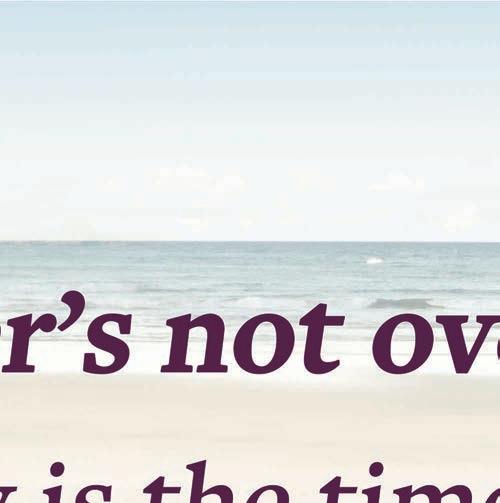



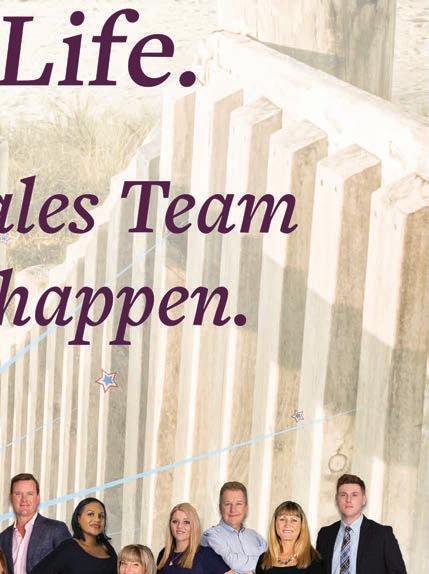











By DAWN ENNIS
LAS VEGAS — STLV, the annual Star Trek Las Vegas convention — hosted by Creation Entertainment — this month brought together fans of all ages, abilities, and affections for the many incarnations of the 59-year-old science fiction franchise, from the original TV series to new streaming shows and online games.
Boldly going among them were dozens, if not hundreds, of LGBTQ Trekkies and Trekkers alike, living the ideal that predates DEI by more than 50 years: An anagram that Trek creator Gene Roddenberry devised as the basis of Vulcan philosophy (as well as an early merchandising opportunity).
“‘Infinite Diversity In Infinite Combinations,’” TrekCulture podcaster Seán Ferrick told the Los Angeles Blade. “This is the type of community that is tailor-made for embracing,” said Ferrick, who identifies as pansexual. “The truth is a lot of the world doesn’t do that.”
Ferrick traveled from Wexford County, Ireland, to attend what he called “the biggest Star Trek convention of the year on the planet,” and to judge a cosplay competition.
“They might be wearing Vulcan ears or they might have fringy teeth or something, but this is a tailor-made community about spreading love and joy,” he said. “So, when I walk into something like this, what I see is, for a large part, the world as it should be. There is hope out there. I stand at something like this and I see nothing but hope.”
This was the first Star Trek convention this reporter has attended since 1978, and some things have not changed. There was a huge amount of Trek-related merchandise for sale, from tribbles to jewelry and model spaceships. Actor and first-time author Nana Visitor of Star Trek: Deep Space Nine sold out copies of her groundbreaking book about the women in front of the camera and behind the scenes of the franchise, Open a Channel: A Woman’s Trek. And the only people who stood out in the crowd of thousands were the ones not wearing a costume. Three fans put together amazing Vulcan outfits that will appear in an episode that has not even streamed yet, just based on what they saw in a trailer. Some folks even dressed up their dogs.
David’s homemade Starfleet uniform resembles a miniskirt but is called a skant. Male actors as well as women wore them on Star Trek: The Next Generation, and he was hardly the only man wearing one at STLV.
“There is nowhere else I would probably walk around in a dress,” he said. “I came last year for the first time and this was the most comfortable I’ve felt.” That was especially true, given that on this day, the temperature reached a high of 109 degrees in Las Vegas.
David is a gay man from Sheffield in Northern England who said he used to call Los Angeles home. He described his skant as “Pride for Star Trek” and was gratified by the reception of other convention-goers to his cosplay.
“There’s just no judgment. No matter whether someone’s costume looks really homemade, whether it’s really professional, everyone still appreciates that you’re part of the fandom.”
Peeved at Paramount
Judgment, however, was on the minds of some stars who identify as LGBTQ. They talked with the Los Angeles Blade about their fears that Skydance’s purchase of Paramount, the

company that produces Star Trek, would change the franchise’s legendary embrace of diversity, to further appease the Trump administration as it works to eliminate DEI.
“We only have to look at the parent network of this series alone, where Star Trek lives now, where they have bent the knee in order to sell this studio to a right-wing, Trump-loving owner,” said out gay actor Wilson Cruz, who played one of the first out gay characters in the franchise in Star Trek: Discovery and was a trailblazer when he played Rickie Vasquez on My So-Called Life. Cruz was blunt in his criticism of the Paramount sale to Skydance.
“Shari Redstone had no problem selling out the entire company and everyone who works there, and all of the people who have been on screen representing people of color, the LGBTQ community,” said Cruz. “She has completely turned her back in order to keep her family richer than they ever need to be.”
Cruz is also worried for queer representation in the current era, and not just on Trek.
“I think in this moment in history, it means a lot more to me now than it even meant eight months ago, which it meant a lot to me then, but given the fact that we’re going to start seeing less and less of us on TV, we’re being erased,” he said. “And because we are being erased, because we are being shamed again, it’s really important to celebrate the success of the representation that we have had, to remind people why it’s important for people to be able to see themselves, to have their lives mirrored back at them, to inspire them through our stories, that that kind of storytelling has value and relevance and has even more relevance today.”
In between signing autographs, Cruz voiced gratitude for the fans who say his portrayals reflected their lived experiences.
“I’m incredibly moved every time somebody comes by, whether they’re talking about Ricky Vasquez or Hugh Colbert, that I’ve been able to give people a voice and a story that they can identify with that makes them feel like they belong, in a moment where there’s so little of that.”
“I’m very fortunate to be part of two major things,” said Cruz’s Discovery costar, out gay actor Anthony Rapp. “Rent and Star Trek have these profound communities of fans around them. I say ‘fan.’ I mean, it’s not a word that I have any animosity toward. But it doesn’t quite speak to the level of connection to these pieces of art.”
As for the deal Cruz railed against, Rapp said it was “too upsetting to engage too much.”
“I’m on a little bit of a media brown-out because of having two toddlers. I’m certainly aware that Colbert was canceled, which is very upsetting. I heard Wilson mention something about Trump getting them to agree on a certain kind of media coverage,” he said, referring to the installation of an ombudsman, “who will receive and evaluate any complaints of bias or other concerns” at CBS News, according to The Hollywood Reporter. “I mean, that’s insane.”
Out actors Cruz and Rapp, who appeared on Star Trek: Discovery from 2017 until 2024, were among the more than 100 actors and creative types on hand who gained fame thanks to Trek and other sci-fi projects. They joined iconic fan favorites William Shatner, Scott Bakula, Kate Mulgrew, Jeri Ryan and Edward James Olmos — all of whom played captains of various fictional starships — in meeting their fans, face to face, for
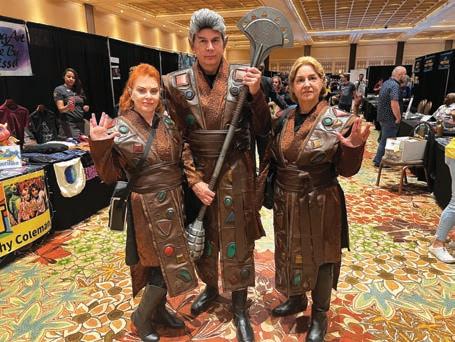
a price.
Those fans, dressed in every conceivable and even inconceivable cosplay creations, stood for hours in long lines for a signed autograph and to pose for photos with their heroes. They packed ballrooms to hear behind-the-scenes stories at a wide variety of panel discussions and presentations. The best seats cost $1,400, with photos and autographs costing anywhere from $25 to $300 apiece.
This reporter was next in line to ask Shatner a question at his one and only appearance on stage, as he rhapsodized at length about nature, the planet, and beyond.
“We all belong to each other, and all of us belong to the rest of existence, the world, the universe,” said Shatner. “We are linked chemically and electronically with the word ‘quantum’ attached to it. ‘Quantum’ is the study of the small particles called atoms. We should all never forget the awesomeness, the incredible forces that we have no idea about that work everywhere in the universe. It also suggests that we are caretakers of our earth and we must, without question, care for the water, the air, the earth.”
It was at that point that the 94-year-old actor decided to end his hour-long talk, 10 minutes early. So, unable to ask him a question, I joined a queue with hundreds of attendees, who paid to have a moment with the original Captain James T. Kirk. There he was, seated on a chair at the end of the queue, as a fast-moving assembly line of fans stood by him for a very quickly posed photograph, and swiftly moved along.
I had literally just enough time to utter one sentence, and so I asked him, “What message do you have for queer Trek fans?”
“Keep on queerin’!” said Shatner, with a smile captured in a photograph.
That was a welcome message for two groups that celebrated their marginalized status in society: The Lambda Quadrant and the SyFy Sistas
Tamia, the SyFy Sistas podcast host, spoke at their panel about how in the past, there was backlash directed at Black fans, at “people that look like us and didn’t want us in the room,” she said. “That’s not what Star Trek is about. But I think it’s changing.”
“Many, many people come up to us at the table and say that historically they have not felt comfortable expressing their full and true selves, even here in the fandom,” said Ursa Wright of the Lambda Quadrant, a group dedicated to promoting queer representation in fandom. “We are the one table in the whole place with big rainbows everywhere. So, people, for a long time, they come up and they tell us they did not actually feel safe. Like, they can wear their Star Trek outfit, but nothing overtly expresses that they would be gay, or whatever it is, because they still didn’t feel comfortable, because no one else was in the space doing the thing. Which, in our year of the Lord, how are we still there, where people feel that?”

Boldly LGBTQ
The Blade asked queer fans what Star Trek means to them.
“Accepting everyone,” said Sarah from Southern California. “Everybody is who they are.”
“Being free,” said Rachel from Nebraska. “To express anything and everything.”
“Togetherness,” added David who hails from Nova Scotia. Boyfriends Anthony and Ryan said “acceptance” and “tolerance.”
“Star Trek is what this world needs to strive for,” said Tom Noe of Pleasanton, Calif., a straight ally whose partner is pansexual. “Acceptance of all races, sexualities, regardless of what they are.”
“It is a different way of looking at the world, and I appreciate that,” said Jess from Upstate New York. She was wearing a T-shirt emblazoned with a rainbow and the face of an omnisexual alien character from Star Trek: Deep Space Nine, and the words, “Friend of Garak.” When asked why she chose to wear that top, Jess said, “Because I’m gay.”
“Sounds Gay, I’m In,” was the message on a shirt worn by a gay fan from New Jersey who asked to be identified as Sandra. “Because here is the only place I feel safe to be out. I’m not out with my family or my co-workers,” she said. “Star Trek makes me feel like there is hope that eventually I can live free. But I don’t know how it’s going to happen in the next couple of years.”
“Let’s just say I have not been able to go to the entire convention without seeing a Trump hat,” said Kyla, an out transgender nonbinary fan who was visiting Las Vegas from just outside Sacramento. They said didn’t feel comfortable using the casino hotel’s strictly binary restrooms without an escort. “But I have felt more safe here than I have on the strip,” she conceded.
“We have nonbinary characters. We have same-sex characters and relationships, and we need more of that,” said a pansexual fan who goes by the nickname Hoops. “As the kids would say, Star Trek is very woke. Like, it just means you have a heart and, like, compassion,” she said.
“There’s so much hate and so much bigotry and homophobia and transphobia. All of that,” said Hoops. “We’re just here to care about other people. And we just want to love other people. And why do you care who someone’s in love with or who someone takes care of? Or how they identify? What they’re wearing? If they’re wearing a skirt or pants? Does it really matter what path they’re taking? And in Star Trek, nobody cares about any of that.”
STLV also offered fans a chance to explore strange new immersive tech that allows them to virtually tour the Starship Enterprise, created by OTOY and The Roddenberry Archive.
“We think about this stuff a lot,” said OTOY CEO Jule Urbach about LGBTQ+ representation in his digital exploration of the franchise, which started with the first film in 1979 and only grew after he became childhood friends with Roddenberry’s son, Rod, 40 years ago. “It’s really part of representing everything. And that’s a big part of Star Trek.”
OTOY’s latest short film reunites two iconic characters using “digital masks:” Kirk visits Spock’s deathbed in “765874: Unification,” with actors Sam Witwer and Lawrence Selleck in the roles originated by William Shatner and the late Leonard Nimoy, respectively.
“This is pretty magical,” Urbach told the Blade. “We’re really happy with how it turned out and how people interpreted it.” At star-studded panels, fans watched that short film and also learned of new shows in the pipeline and potential new movies. Next month, Paramount debuts a new audio drama
podcast that tells the untold story of arch villain Khan Noonien Singh’s life in exile, featuring the voices of Naveen Andrews, best known for his role in Lost, and of gay icon George Takei, among others.
“It’s never far from the minds of the people creating these shows that how important representation is, how vital it is,”
Kirsten Beyer, executive producer of Star Trek: Khan and a nine-year veteran Trek producer and writer, told the Los Angeles Blade in a phone interview following the convention. “And never, ever more so than now.”
During a panel discussion with her out queer costar Jess Bush, Celia Rose Gooding of Star Trek: Strange New Worlds told the Blade she’s hoping to see more LGBTQ representation in the show, now in its third season streaming on Paramount+.
“As a queer person, I would love to see more of it,” said Gooding, who plays Uhura and is preparing to film the fifth and final season starting next month. “I can neither confirm nor deny what we’re going to get because we haven’t seen a single script yet. But I think for so many reasons, it’s important for marginalized group to see themselves in the future.”
“I’m a Greenwich Villager, so the LGBTQ world is my world, and it’s our world,” said Michelle Hurd, who played Raffi on Star Trek: Picard. In the series finale, written and directed by showrunner and LGBTQ ally Terry Matalas, Raffi is portrayed as the bisexual first officer who had a relationship with her bisexual captain, Seven of Nine, played by actress Jeri Ryan. “We’ve been here, we haven’t gone, we’re not going anywhere, and we’re going to be here until the end of time. And art is the way that we can convey those sort of stories. I hope that we continue to tell those stories more and I hope that this world continues to open its eyes, its arms, its hearts to the fact that love is love is love is love.”
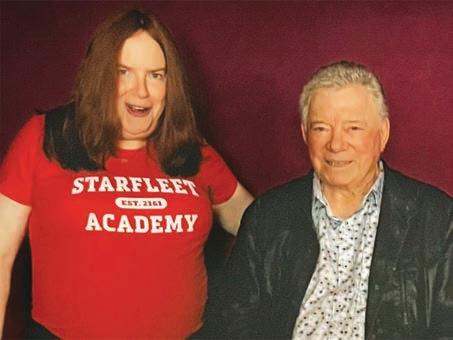
Out gay actor and author Jonathan Del Arco — who played a Borg who became an individual named Hugh in both Picard and originally on The Next Generation — chose the convention to launch his children’s book about the search for belonging, identity and acceptance, Freddy the Alien. He told the Blade it was inspired by both his own childhood and his Trek career, and about the timing as immigration raids are in the news.
“It’s a really important time to make kids feel included, and it’s tough,” said Del Arco, who attended the convention with his husband, Kyle Fritz. “We live in Los Angeles, and you can’t help but be surrounded by the immigrant experience, so you don’t even need the book to have that conversation. It’s happening all around,” he said.
In a panel discussion, Del Arco revealed that although noth-
ing was written about Hugh’s orientation, he chose to play him as having fallen in love with Evan Evagora’s character, Elnor, “I decided when I found out I was getting killed, and I had this young man on the ship, I figured it would be kind of cool if Hugh had found love for the first time, only to die. And he did.”
Andrew Robinson played a Cardassian named Garak on Deep Space Nine and confirmed to the Blade he “always” considered his character was something other than heterosexual, such as an omnisexual, even though his orientation was never revealed in the series. However, in 2024, he played Garak once more, in an episode of the animated series Star Trek: Lower Decks, created by LGBTQ+ ally Mike McMahon. This time his character was in a same-sex relationship with Dr. Julian Bashir, played by Alexander Siddig.
“I’ve never played an alien before,” said Robinson. “And one of the things that occurred to me was, there are certain hangups that they don’t have that we have. And one of them was the whole thing about sexual identity.”
Terry Farrell, who played Jadzia Dax on Deep Space Nine, spoke about a 1995 episode, “Rejoined,” in which her character had a romantic relationship with another woman. Some Southern TV stations, primarily in the so-called “Bible Belt,” refused to air that episode. Many transgender fans have embraced Dax as someone who shares their experience of living in more than one gender, and “Rejoined” featured the first same-sex kiss in Trek.
“What I was most proud of was, in that episode, nobody talked about the fact that we were both women,” said Farrell. “I have goosebumps right now. Love is love. It doesn’t matter what package you come in. If that’s your one life, enjoy it, be you. It’s such a struggle in our culture to just be yourself. And clearly it can be dangerous to be yourself. And that’s horrifying to me.”
For the most part, this was an inclusive and entertaining event for one and all, especially for the many attendees who used wheelchairs and scooters to travel around the incredibly large convention space, which was located a considerable distance from the main casino hotel. But it’s only fair to point out that there were some issues, such as the lack of all-gender bathrooms.
Observers also noted that although this 23rd convention organized by Creation Entertainment was expanded to five days for the first time, it was not as well attended as 2024’s event. That’s in line with a trend that reports say has hit Las Vegas hard this summer, with tourism down 11 percent from a year ago. A spokesperson for Creation did not respond to an email request for comment on attendance.
The Blade also asked for comment on what were described later as “inadvertent” slights to the one and only Black woman to appear on a panel of Star Trek writers at the convention on the evening of Saturday, Aug. 9.
Once the four men and two men were introduced, the host — “Inglorious Treksperts” podcaster Mark A. Altman — had to be reminded that he had not invited Star Trek: Strange New Worlds story editor and episode writer Onitra Johnson to join them; she was still backstage, waiting. After finally being introduced, she was seated at the end of the stage next to legendary out gay screenwriter and author David Gerrold, who three times answered questions intended for Johnson. The third time, members of the audience interrupted him, shouting, “Let her speak!” which prompted Altman to blame “bad acoustics” in the ballroom.
While fellow Treksperts podcaster Daren Dochterman called these repeated slights “inadvertent” in a face to face conversation with the Blade on Aug. 10, neither he nor Altman, nor Creation, officially responded to messages from the Blade seeking comment.
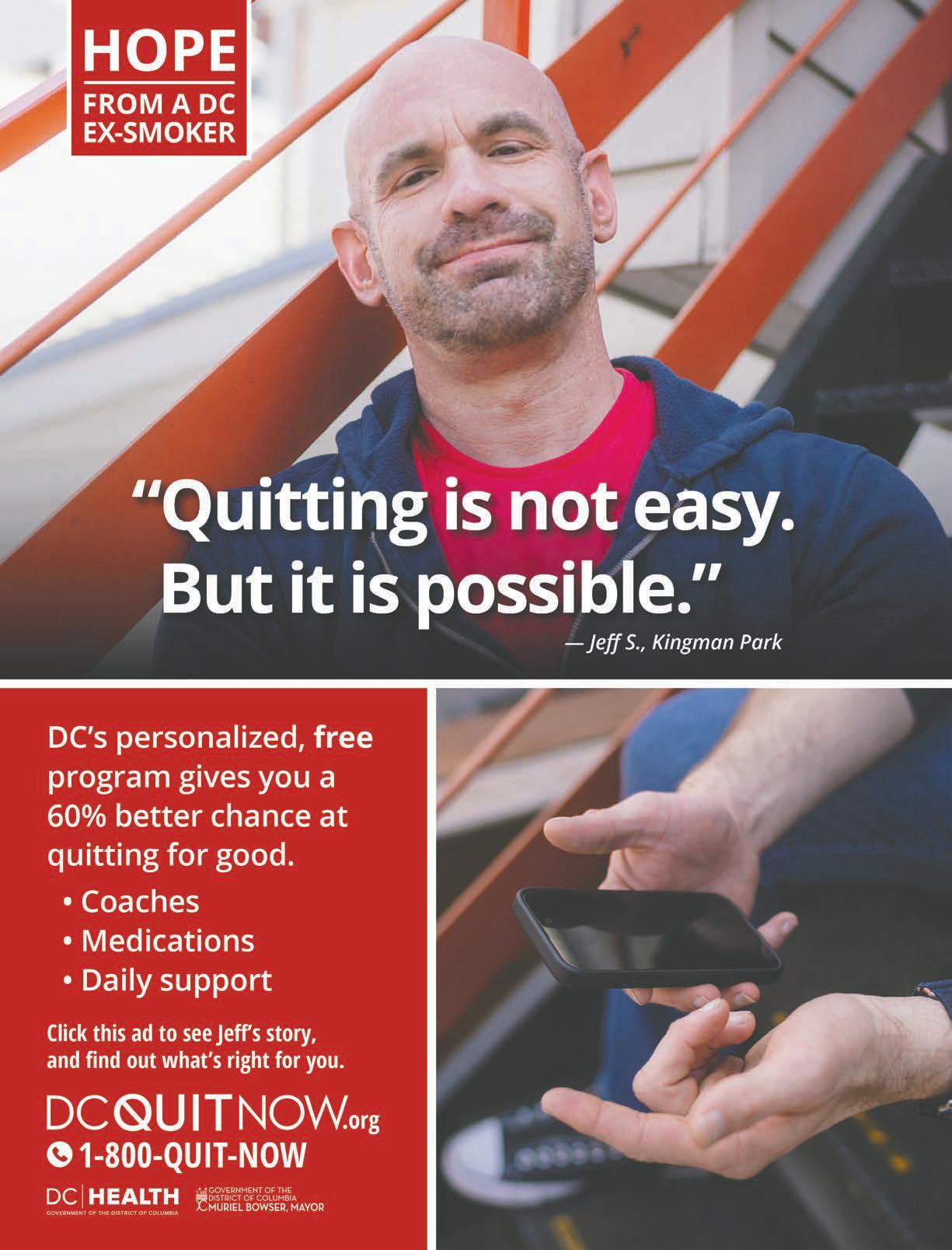
By TINASHE CHINGARANDE
“Center Aging Friday Tea Time” will be at 2 p.m. in person at the DC Center for the LGBT Community’s new location at 1827 Wiltberger St. NW. This is a social hour for older LGBTQ+ adults. Guests are encouraged to bring a beverage of choice. For more details, email adam@thedccenter.org.
GoGayDC will host “LGBTQ+ Community Happy Hour” at 7 p.m. at Freddie’s Beach Bar and Restaurant. This event is ideal for making new friends, professional networking, idea-sharing, and community building. This event is free and more details are available on Eventbrite.
GoGay DC will host “LGBTQ+ Community Brunch” at 12 p.m. at Freddie’s Beach Bar & Restaurant. This fun weekly event brings the DMV area LGBTQ+ community, including allies, together for delicious food and conversation. Attendance is free and more details are available on Eventbrite.
DC Drag Brunch Saturdays will be at 12 p.m. at 1610 14th St. NW. Enjoy outstanding performances by glamorous drag queens and celebrated celebrity impersonators, featuring Taylor Swift, Lady Gaga, Beyoncé, Britney Spears, Nicki Minaj, Ariana Grande, Whitney Houston, Cher, and many more. Tickets cost $32.49 and can be purchased on Eventbrite.
LGBTQ People of Color Support Group will be at 7 p.m. on Zoom. This peer support group is an outlet for LGBTQ People of Color to come together and talk about anything affecting them in a space that strives to be safe and judgement free. There are all sorts of activities like watching movies, poetry events, storytelling, and just hanging out with others. For more information, visit thedccenter.org/poc or facebook.com/centerpoc.
GoGayDC will host “LGBTQ+ Community Happy Hour” at 7 p.m. at Pitcher’s DC. This event is ideal for making new friends, professional networking, idea-sharing, and community building. This event is free and more details are available on Eventbrite.
Universal Pride Meeting will be at 7 p.m. on Zoom. This group seeks to support, educate, empower, and create change for people with disabilities. For more details, email andyarias09@gmail.com.
Job Club will be at 6 p.m. on Zoom. This is a weekly job support program to help job entrants and seekers, including the long-term unemployed, improve self-confidence, motivation, resilience and productivity for effective job searches and networking — allowing participants to move away from being merely “applicants” toward being “candidates.” For more information, email centercareers@thedccenter.org or visit www.thedccenter.org/careers.
Center Aging Women’s Social and Discussion Group will be at 7 p.m. on Zoom. This group is a place where older LGBTQ+ women can meet and socialize with one another. We will have discussion, activities, and a chance for you to share what you want future events to include. For more details, visit the DC Center’s website.
Center Aging will host a screening of “Before We Forget” at 4 p.m. at the DC Center for the LGBT Community. This event will include a short discussion about the film after the viewing for those who wish. For more details, email adamheller@thedccenter.org.
The DC Center’s Fresh Produce Program will be held all day at the DC Center for the LGBT Community. People will be informed on Wednesday at 5:00 pm if they are picked to receive a produce box. No proof of residency or income is required. For more information, email supportdesk@thedccenter.org or call 202-682-2245.
Virtual Yoga with Sarah M. will be at 7 p.m. on Zoom. This is a free weekly class focusing on yoga, breathwork, and meditation. For more details, visit the DC Center for the LGBT Community’s website.
Labor Day Weekend in Rehoboth Beach is upon us and there’s more than just Sunfestival to keep you dancing. Queer bars like Diego’s are bringing the entertainment. Diego’s features DJ Sago from 9 p.m.- 1a.m. on Friday; a splash party from 5-7 p.m. followed by DJ Brett Oosterhaus on Saturday; and Pamala Stanley on Sunday at 5 p.m.

The DC Center for the LGBT Community will host “The Light Looks Like Us - Intergenerational Reading and Queer Book Fair” on Saturday, Aug. 30 at 12 p.m.
This will be an inspiring afternoon celebrating queer youth voices, community, and literature. The DC Center will partner with Shout Mouse Press for a special event featuring D.C. poet and author Tony Keith Jr in conversation with youth authors Hakim, Oliver, and Lauryn — contributors to the powerful new anthology “The Light Looks Like Me: Words on Love from Queer Youth.”
This event is free. For more details, visit the DC Center’s website.









By ABIGAIL HATTING
When CAMP Rehoboth invited comedian and author Zach Zimmerman to headline Sunfestival, it became the moment Zimmerman realized that it’s possible to make a livin ma in people lau h.
CAMP Rehoboth, an LGBTQ community center in Rehoboth Beach, Del. is hosting its annual Sunfestival fundraiser over Labor Day weekend on Aug. 30 and 31. The opening act, Corey Andrew, and headliner, Zimmerman, spo e with the ashin ton lade ahead of the events.
Andrew is a singer, songwriter, comedian, and media personality and part-time resident of Rehoboth. After opening for Sunfestival last year, Andrew was asked to return for a 15-minute set. He said his upcoming performance can be described as heartfelt, passionate, and fun.
“I want to leave them with a little something that prepares them for the big dance party that happens on the followin ni ht ndrew said.
The following night, DJ Robbie Leslie and DJ Joe Gauthreaux will perform at a dance party at the Rehoboth each onvention enter.
ein an artist has in uenced ndrew s wor he said. When he was starting out, there were not as
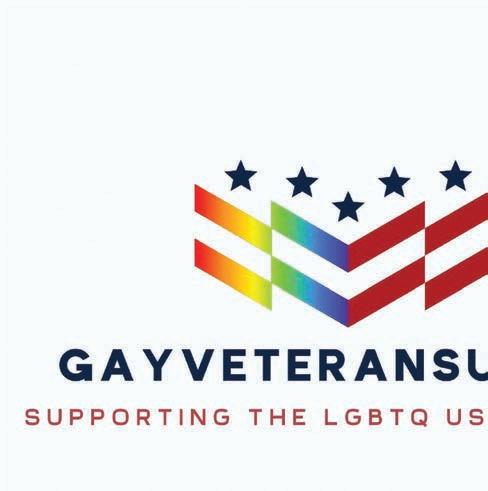
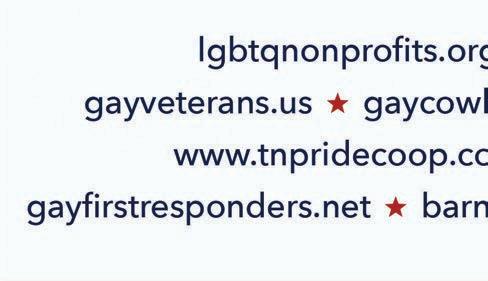
many examples of out artists. Andrew said he loves sharin his stor about overcomin adversit findin his true voice, tuning out the noise and being the best you can be.
“I’ve been doing this for a long time, and the majorit of the earl ears were rife with a lot of difficulties Andrew said. “Just by being myself and really accepting who I was, all that informs my creative choices. I’m a gay Black man. That’s what I know. That’s what my art will reect and to tr to be an thin else would not be true to my art.”
Looking ahead, Andrew said his dream is to perform with professional orchestra elmarva i and. Comedy is a powerful art form that has a lot to give and brings people together in a physical space, said Zimmerman, who is working on new material for Sunfestival. Zimmerman tries to be vulnerable about the stories told in the performances and said that when we share wants and needs in a vulnerable way, the community can show up.
hat a blessin it is to be able to re ect on life and to ma e a ob out of re ectin on life immerman said. “So do it because you’re interested in it, stay with it be-

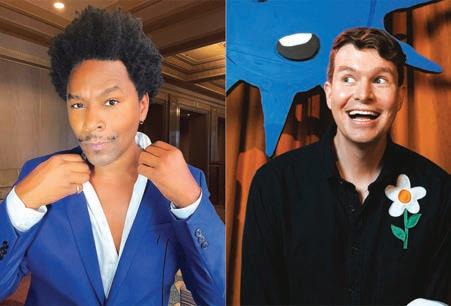
cause you believe in it, and give up … when it hurts too much.”
Sunfestival is about the end of summer and a chance to re ect on all that has happened with a final ni ht of fun, said Zimmerman. After the fundraiser, Zimmerman is going on tour in the fall and writing a second book.
“Comedy can disarm people. It can welcome them in. Everyone loves to laugh,” Zimmerman said. “I think comedy can and has changed the world for better or for worse.”
Tickets for Sunfestival can be purchased at camprehoboth.org.

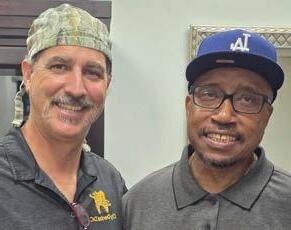






•
•
•
•
•
•






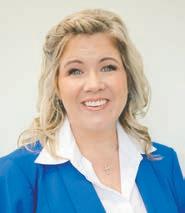





‘Kiss
‘Queer audiences feel identified with what’s happening onstage’
By PATRICK FOLLIARD
In just a few days, GALA Hispanic Theatre in Columbia Heights is kicking off its 50th anniversary season with an exciting revival production of playwright Manuel Puig’s “Kiss of the Spider Woman” (Sept. 4-8).
First a novel published in 1976 (the same year GALA was founded), then a play, followed by a Broadway musical and fi lms, Kiss of the Spider Woman is a stunningly enduring work.
Set in 1975 Argentina, the play centers on unlikely cellmates Valentín, a Marxist revolutionary, and Molina, a trans woman who seeks escape in the imaginings of fi lm noir and the glamorous ladies of Golden Age Hollywood. Over time, a closeness develops between the two prisoners, one that wouldn’t have occurred beyond prison walls. Deep understanding, resilience under oppression, and intrigue ensue.
José Luis Arellano, the award-winning Spanish director who’s helming the GALA production, says it’s a tale familiar to him and his two-man cast: “For Spanish speakers, Puig [famed Argentine author and LGBTQ activist] is a most important author, particularly important for the gay community. It was the fi rst time when we saw someone like ourselves sharing feelings in a book and onstage.
“Growing up as a teenager in Spain I had fi lmmaker Pedro Almodovar and Puig. They both loved melodrama and 1950s Hollywood. And they both liked to tell a complicated story to talk about central things. And today it feels relatable.”
After GALA co-founder Hugo Medrano’s death in the spring of 2023, his wife and

GALA executive director Rebecca Medrano began to think about the 50th Anniversary season. She, along with GALA’s current artistic director Gustavo Ott, decided to open the season with a revival of “Kiss of the Spider woman,” a seminal 1994 GALA production that earned Hugo Medrano a Helen Hayes Award for outstanding lead actor as Molina—the fi rst ever for a Spanish-language performance in D.C.
“Ordinarily, Hugo never liked to revive anything,” says Rebecca Medrano. “His attitude was that’s done, let it go, and it’s a new day. But Kiss of the Spider Woman was an exception.”
She asks “What could be timelier?”
It’s the story of a trans person sharing a prison cell with a political revolutionary set against Argentina’s Dirty War, another time when people were disappeared off the street.
Performed in Spanish with English surtitles, the original script has undergone some cuts and a couple changes, making it even more relevant. Director Arellano has also imbued the production with some nods to Hugo Medrano; he promises that beyond the characters’ glaring differences, audiences will learn how they are similar as human beings.
The cast features out actors Martín Ruiz as Molina and Rodrigo Pedreira as Valentín. Last season the actors performed together at GALA in Gustavo Ott’s lively musical Momia en el clóset: Evita’s Return. In that show the roles were rather reversed with Ruiz playing strong man Juan Perón while Pedreira sashayed as a campy gay general.
“Both are wonderful actors,” says Rebecca Medrano. “Here, as Molina, Martín reveals a sensitive side that I haven’t seen before. This is a great opportunity to see these characters played two strong actors.”
Ruiz thoroughly enjoys playing Molina. “I came to the production having read the book seen the movie. I soon learned that playing Molina is the most beautiful and important challenge in my career to date. We are talking about a lot of things. Beyond a relationship between two characters, we’re talking about love between two lonely people. Molina is a big character for sure.”
In playing Valentín and other parts, Pedreira has grown to appreciate the versatility involved in acting. “As a boy, I heard my father say gay was bad. Outside the home, I heard that as a gay man too. Consequently, my personality had to have different faces. I had to be careful what I might reveal. With acting I can be the feminine character and the butch man.
“These characters live inside of us. Queer audiences feel identifi ed with what’s happening onstage.”
While staying in temporary digs in the Columbia Heights/Mount Pleasant area, visiting actors and designers are sometimes disturbed by the unnerving sound of late-night helicopters. Often, they hear from friends abroad calling to check on how things are going in D.C.
The ever-plucky Rebecca Medrano reassures them: “We can’t let fear dominate. We’re going to open. We’re going to be fi ne. Just don’t go out dancing and get into any trouble.”
‘Kiss of the Spider Woman’
3333 14th St., N.W. | September 4 – 28 | Galatheatre.org















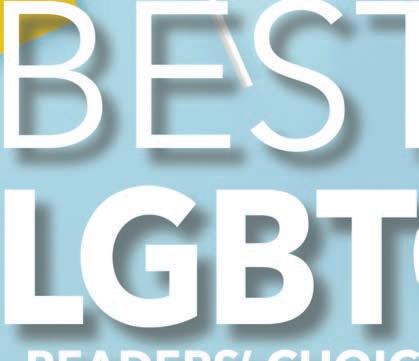

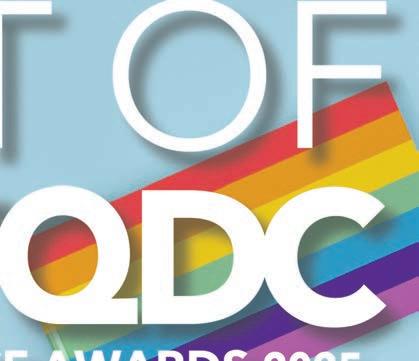




















































































Now more than ever, r it ’s impor tant to celebrate and Nowmorethanever,it’simportanttocelebrateand uplif t the people, places, and organizations that upliftthepeople,places,andorganizationsthat make our communi y strong. makeourcommunitystrong.


























































Nominate your fa orites in each categor through Nominateyourfavoritesineachcategorythrough September 7th at BestOfLGBTQDC.com September7thatBestOfLGBTQDC.com


























































































































































































































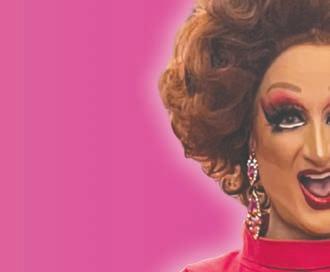















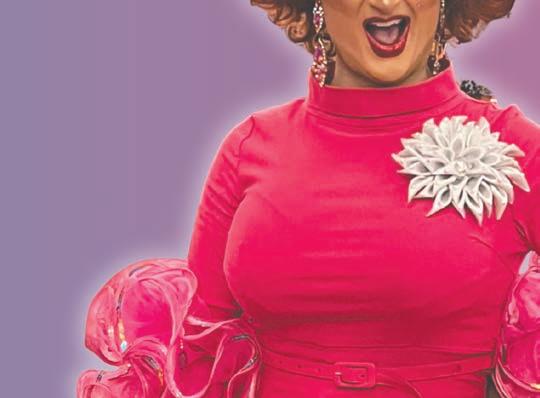

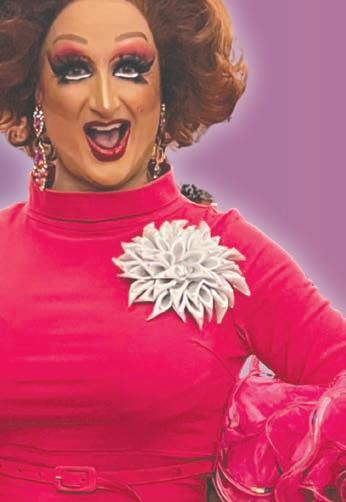
By JOHN PAUL KING
Before judging “Honey Don’t” – the second installment of a “lesbian B-movie trilogy” from filmmaker Ethan Coen and co-writer/spouse Tricia Cooke, which opened last weekend to wildly mixed reviews – it might be useful to brush up on what exactly is meant by the term “B-movie.”
A designation originating in the days of classic Hollywood’s studio system, it was coined to refer to the kind of lower-budget, less-prestigious “filler” movies that were produced to accompany the main attraction in the then-standard double feature format. Customarily written off by critics of the day as unworthy of serious attention, they nevertheless provided a proving ground for ambitious young film artists, and some of the classic-era films deemed most influential today – particularly within the film noir category, which seemed a particularly convenient fit for B-movie treatment – came out of it.
Later, when the studio system began to implode during the cultural shift of the 1960s, the same kind of cheaply produced films evolved into the grungy, countercultural “exploitation” movies that entertained a drive-in generation that had learned to see outside the bubble of conventional expectations, These movies were wild, imaginative things that often pushed boundaries with gratuitous excesses of sex, violence, and authority-challenging attitude, and while they sometimes dared to tackle controversial themes under the guise of sensationalist escapism, they, too, were largely written off as “trash” by most contemporaneous tastemakers. They also inspired a whole new wave of cinema artists, from Quentin Tarantino to Ari Aster, who would build critically-lauded careers with work that not only emulated the over-the-top extremity of their style, but treated it like the high-concept art that it was.
With that in mind, “Honey Don’t” plays like both a campy spoof and an artful homage. Embracing the generic-yet-classic film noir “private eye” formula, it upsets the cart right from the outset by flipping the gender of its central archetype to offer the stylish, savvy, and no-nonsense detective Honey O’Donaghue (Margaret Qualley) as the story’s hard-boiled protagonist. Set in a nebulously contemporary Bakersfield (which feels like a picturesque metaphor for blighted-and-corrupt smalltown America), it follows her as the unexpected demise of a would-be-client draws her into a mystery with connections to a charismatic local church leader (Chris Evans); finding an ally and love interest in butch bad-girl police officer “MG” (Aubrey Plaza), she uncovers a sinister thread of predatory corruption that may threaten even her own family – specifically her beloved niece (Talia Ryder), whose relationship with an abusive boyfriend places her at particular risk of becoming a victim of whatever twisted mind is operating behind the town’s string of mysterious deaths and disappearances.
It’s a wild-and-wooly, ludicrous tale, a self-aware exercise in style which winds its bemusedly hard-edged mystery around a core that mirrors both the cynicism and the romance of its hard-boiled neo-noir inspirations. Full of red herrings, implausible coincidences, and blatant plot holes, it plays into a pitch-black sense

of irony (a Coen trademark, after all) as it twists its way through a near-absurd landscape of banality, disaffection, and casual amorality, weaving a labyrinthine narrative that leads to multiple dead ends before delivering an over-the-top climactic confrontation and a tauntingly murky resolution. Along the way, it indulges in near-baroque levels of cartoonish-but-grim violence, graphic sex, and bleakly misanthropic character study, all of which highlight the themes of misogyny, cyclical violence, casual cruelty, and corrupted humanity that underscore the whole bemusedly perverse plot.
All of that might be hard to digest for audiences who are looking for a mystery story, who come to it for the queer representation or as a nostalgic throwback with a sexy twist. “Honey Don’t” offers those things, to be sure, but it packages them in a hyper-violent, iconoclastic reinvention of “detective noir” fiction and claims feminine space in a genre almost always dominated by males. It’s a movie designed to challenge the status quo, to disrupt conventions, to push past comfortable boundaries and shake us up; threads lead nowhere, circumstances change unexpectedly in an instant, and the archetypal wise-cracking private dick is now a sex-positive, outand-proud “lipstick” lesbian. We’re prepared for a neonoir movie to exist in a bleak and meaningless universe, but all that is a lot to take if you’re not expecting it.
That means that “Honey” might not be for everyone – but for those with a taste for it will find a lot to appreciate.
Coen (directing solo from brother Ethan for the second time) exerts a more consistent control over tone this time out than with last year’s “Drive-Away Dolls,” while still maintaining the kind of unpredictable anarchy that ties it to the pulpy thrillers that inspired it.
The heat-blasted Bakersfield setting gives the movie a sense of place that feels at once distinctive and universal, and there’s a clear love of cinema that manifests in subtle nods to numerous classic movies of the past. He also populates the movie with a smart, game cast who seem to embrace the chance to play outside their lines of their normal career. Plaza takes her familiar edge of vaguely hostile irony to new heights as Honey’s butch and antisocial “girl Friday,” and Evans clearly relishes the opportunity to go against type as a smug, slimy, self-satisfied pastor that seems like the polar opposite of his “Captain America” image. Lera Abrova is electrifying as a mysterious French femme fatale, while Charlie Day provides a great comic foil as a police detective who can’t quite get it through his head that Honey likes girls; Gabby Beans makes for yet another strong, intelligent female character as Honey’s assistant and confidant.
It’s Margaret Qualley’s movie, though. She gives a star performance as Honey, providing a welcome and much-needed portrait of a fully empowered female hero. She can outthink, outmaneuver, and see through any opponent she encounters, and she can look great doing it; she’s a genuine badass – and on top of all that, she’s queer, too! Qualley takes all of that and makes it convincing, proving once more that she’s an actor on her way to becoming an icon.
As for the movie itself, we won’t pull punches: It’s the kind of out-of-the-box film that people are either going to love or hate; so if you have a problem with any of what we just wrote about it, maybe you should just skip it. For everybody else, it’s a sexy, thrilling, funny and artfully filmed little gem, perfect for late summer enjoyment.






















































































I just want to be seen as me
By MICHAEL RADKOWSKY





I’m having a hard time with being gay and I wonder why everyone seems to “get it” but me. I’m only 24 but I feel like I’m living a 1950s gay man’s life: Lonely and feeling bad about myself.



ther of these are solutions, but they may help you begin to move away from self-denigration and loneliness.
A few thoughts to mull over in response to some of the big concerns you raise:
My issue isn’t religious (I didn’t grow up with any strong religious faith or proscriptions). It’s just that I can’t get rid of the feeling that there’s something wrong with being gay.






From a basic biological point of view, being gay doesn’t make any sense. The real purpose of sex is for procreation. So I feel like a dud from that angle.


You don’t have to live your life in any particular way. All gay men aren’t the same. If you don’t like partying, you don’t have to party. The “scene” is big and it’s what people mainly see. But there are many gay men who want a non-scene life. I am hopeful you can find some of them, to alleviate your feeling of being alone.
Also, I feel like I’m part of a weird minority. Most people are straight, the world is set up for them, that’s what’s considered normal. I don’t want people to see me through a stereotyped lens of how they think gay people are, or how gay people act. I don’t want to be seen as “queer” or strange in some way. I just want to be seen as me.

Michael, for of them and that’s depressing too. I don’t think they’d reject

I hate feeling different from all my friends. I haven’t told any of them and that’s depressing too. I don’t think they’d reject me but I think they’d see me differently and probably back off some. I’m feeling lots of distance because I’m keeping this

thing secret.



In any case, being gay IS making me different. Just for an obvious example, I don’t share my guy friends’ interest in women so when that is what they’re talking about, I feel lonely

women so when that is what they’re talking about, I feel lonely and fake.

Besides that, I just don’t vibe with gay life. I don’t like nonstop hooking up, or staying up all night dancing and getting
smashed.




tives and wishing I were straight. Life would be much easier. So I

I have been with some guys, but after I have sex I feel bad about myself because I just find myself dwelling on the negatives and wishing I were straight. Life would be much easier. So I don’t have much sex. I’m lonely from that angle too.

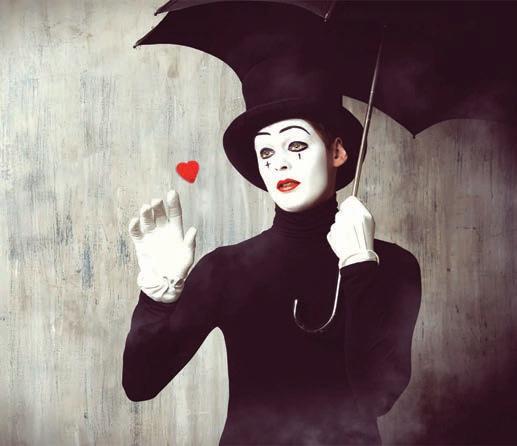

I don’t know if you have any ideas to help me make some peace with the hand I’ve been dealt.
Michael replies:

I’m glad you would like to make your peace with being gay.



The consensus is that sexual orientation is not changeable. So

The consensus is that sexual orientation is not changeable. So hating something about yourself that you cannot change is accomplishing nothing, except for making you miserable.

Yes, sex can be for procreation, but it serves other functions: Pleasure, for one, and a way to express all sorts of feelings for another person, including profound closeness. (And of course, it has been possible to procreate without sex between a man and a woman for quite a while.)

Of course, knowing that intellectually, and doing something about it, are two different things.






Being gay is not easy. You may hear terrible things about gay people and absorb these negative beliefs even before you think from on and on. is
Being gay is not easy. You may hear terrible things about gay people and absorb these negative beliefs even before you think you might be gay. You grow up feeling (and yes, being) different from everyone around you. You may worry about or experience rejection (or worse) from those you are closest to. The list goes
It is possible for a gay man to have a life that includes close connections to straight friends—perhaps closer than you are now experiencing, given that you are keeping a big secret. One question to ask yourself: To what extent are your fears about your friends’ reactions to knowing you’re gay influenced by your negative feelings about being gay?

So, of course, the road to self-acceptance is often not easy. Negative feelings about being gay can have very deep roots.








If you are going to get to a better place, it won’t just happen.
If you are going to get to a better place, it won’t just happen. You have to begin taking action on your own behalf. Two suggestions for a place to start: Commit to challenging your negative thoughts about being gay, perhaps simply by telling yourself whenever these thoughts come up that you want to be kind to yourself; and start looking for connections with people who run at (or close to) your speed. Nei-

One response from an advice column has very limited power to help you make a big shift in how you view yourself. So I urge you to get ongoing support. Find a therapist to talk to on a regular basis, someone who will listen to your concerns, help you to deal with your fears, and encourage you to challenge your negative beliefs, so that you can construct a fulfilling life and stop feeling bad about who you are.
(Michael Radkowsky, Psy.D. is a licensed psychologist who works with couples and individuals in D.C. He can be found online at michaelradkowsky.com. All identifying information has been changed for reasons of confidentiality. Have a question? Send it to michael@michaelradkowsky.com.)
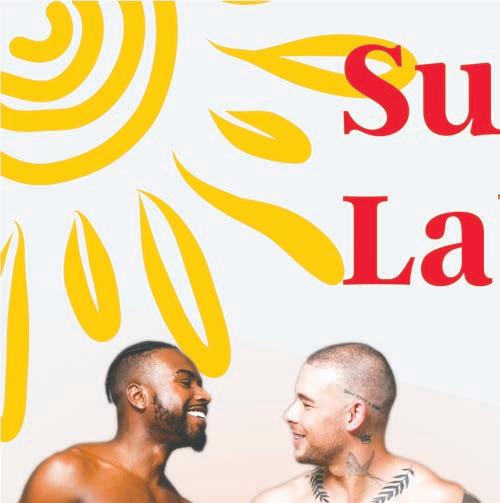
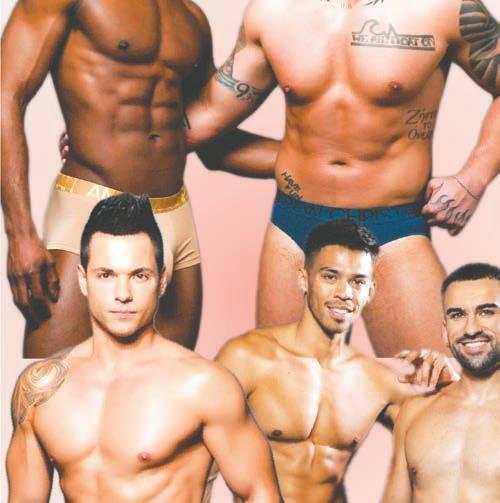














Summer may be coming to a close, but the excitement is just beginning at BMW of Fairfax. As Fairfax County celebrates the season’s grand finale with concerts, fairs, and family fun, we invite you to take part in a celebration of performance, luxury, and unforgettable driving experiences. End the season in style and start fall with the ultimate driving experience from BMW of Fairfax with these unbelievable offers.









































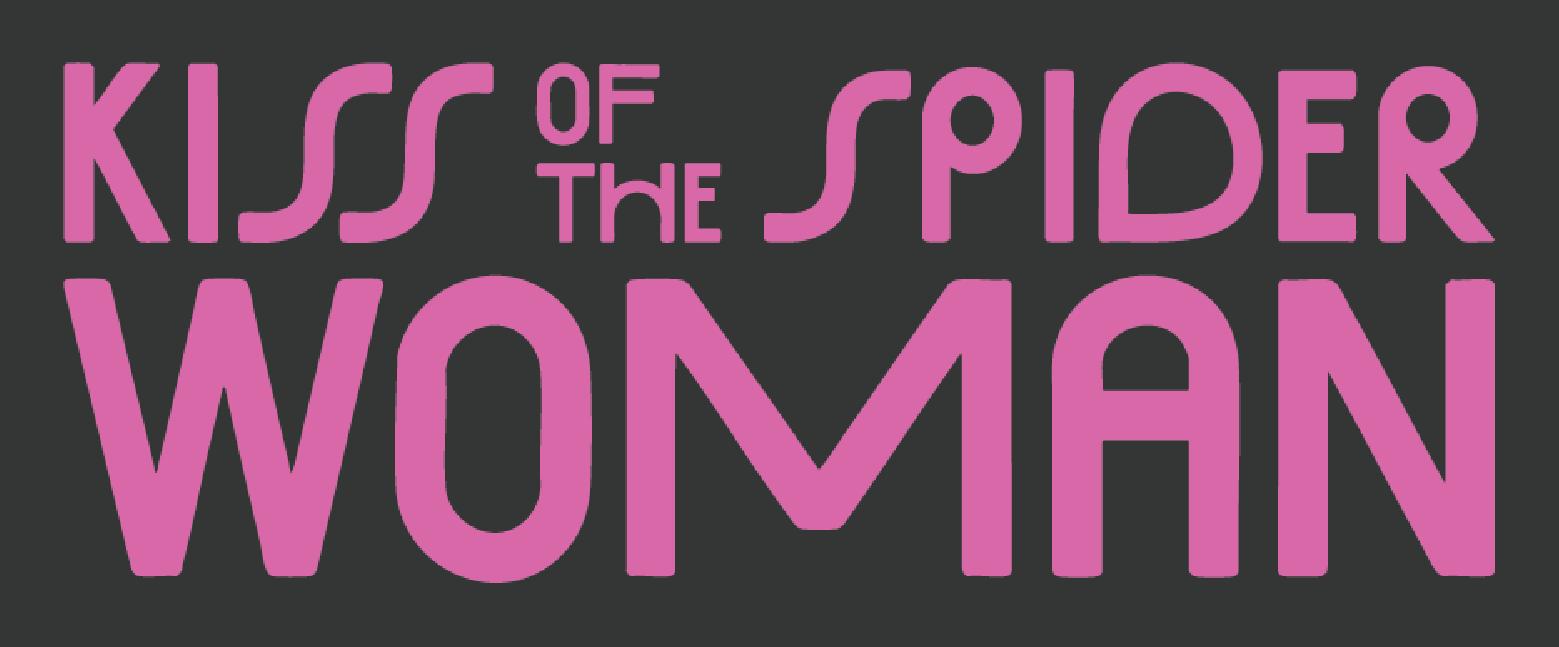









By VALERIE M. BLAKE
There’s a moment every year when the air shifts— when the sun lingers a little lower, the evenings cool a little faster, and the first golden leaves crunch underfoot. That’s the moment we know fall has arrived. And just as we swap sandals for boots and iced tea for spiced cider, our homes too can join in the seasonal shift.
Preparing your house for fall isn’t only about chores, but since my home is once again on the DC Hidden Gems of SE tour next month, I decided to get a head start on tasks that could normally wait another month. Even though the trees have not yet begun to change color, there is still plenty to do.
During the past month, I have seen my lawn evolve from a sea of weeds and invasive ivy to a manicured area where a “brick path to nowhere” winds in a circle, once again becoming the focal point of the east yard. The area has also been brightened by removal of several limbs from trees that spilled over my neighbor’s fence and blocked the sunlight.
The perimeter of the back yard has been revived with transplanted euonymus and the addition of strategically placed colorful perennials, accented by fresh mulch. The rock garden has been refreshed and the front planters sport new Admiration Barberry shrubs.
As fall approaches, raking leaves, trimming back summer’s blooms, and planting bulbs for spring aren’t just tasks—they are ways of honoring the rhythm of the seasons. Picture yourself tucking in your garden, much like pulling up a cozy blanket, knowing it will rest until warmer days return.
Of course, fall is also a time to tend to the little things that make life easier as the season unfolds. These quiet acts of care give you peace of mind, leaving more room to enjoy the season itself.
On the outside, drain and store garden hoses, shut off exterior water valves, and consider insulating outdoor faucets to prevent freezing later in the season. Cover or store patio furniture to protect it from the elements. If you have a deck, fall is the perfect time to clean and reseal it to protect the wood from moisture damage.
Inside, test smoke detectors and carbon monoxide alarms, replacing batteries as needed. If you have a fire extinguisher, check the pressure gauge to confirm it’s still in working order. Flip each circuit breaker off and on to ensure the connection is stable, and make sure your heating system is cleaned and ready before the first frost. Don’t forget to set any automatic lights to turn on earlier, so you don’t come home to dark pathways and entrances.
Fall is also about the small indulgences: a candle flickering in the corner, the aroma of apples baking in the oven, or a kettle always ready on the stove. These sensory details create an atmosphere where the every
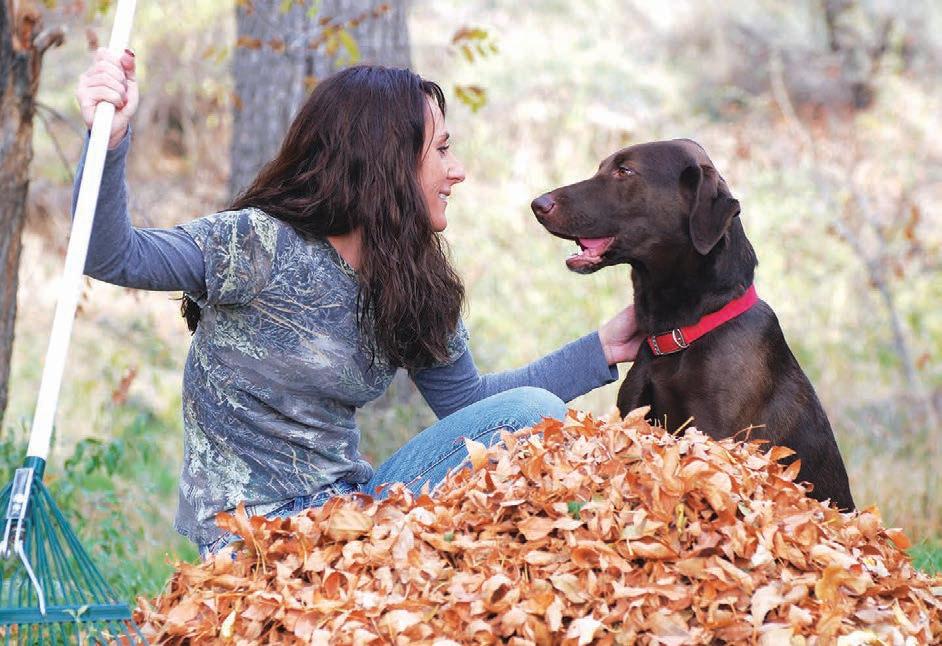
day feels special. Imagine curling up with a good book, a soft blanket, and the gentle glow of lamplight as the wind stirs outside—that’s the heart of fall at home.
There’s nothing quite like a fire crackling in the fireplace on a chilly autumn night. Before you light that first flame, give your hearth a little care—whether it’s a sweep for a wood-burning fireplace or a check-up for gas. Stock a neat basket with logs or kindling and keep matches close at hand, ready for spontaneous cozy moments.
Even without a fireplace, you can create a similar feeling of warmth by clustering candles on a coffee table, hanging twinkling lights along a mantel, or placing lanterns on the porch. Light has a way of softening the shorter days and bringing a sense of magic to the darker evenings.
And while you’re at it, think of the ways your home can welcome connection with friends and neighbors. A basket of extra blankets near the door invites guests to linger on the porch with hot cocoa or an Irish coffee. A simmering pot of cinnamon and cloves can fill the air with the sweet smell of nostalgia. A stack of board games or a pack of cards on the coffee table is apt to turn any evening into a cozy gathering. Fall is, after all, the season for slowing down and savoring.
So when the leaves swirl and sweaters come out of storage, give your home the same gentle shift. With just a little care and a few thoughtful and inexpensive touches, your house becomes more than a place to live—it becomes a haven, a cozy cocoon that makes the enchantment of fall last all season long.
is a licensed Associate Broker in DC, MD & VA with RLAH @properties. Call or text her at (202) 246-8602, email her at www.DCHomeQuest.com, or follow her on Facebook at TheRealst8ofAffairs.





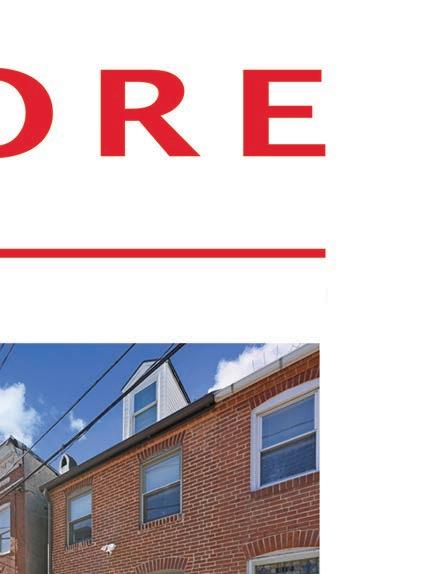
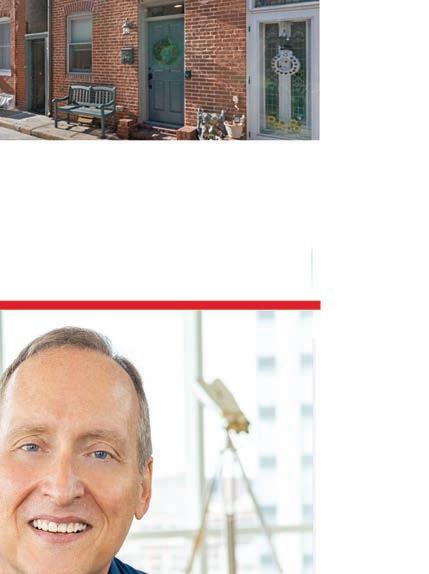
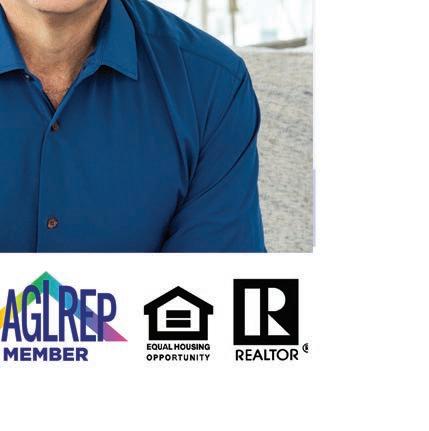

SUPERIOR COURT OF THE DISTRICT OF COLUMBIA
PROBATE DIVISION 2025 FEP 000100
Date of Death January 3, 2024
Virginia S. Maggi aka Virginia Shelley Maggi
Name of Decedent
NOTICE OF APPOINTMENT OF FOREIGN
PERSONAL REPRESENTATIVE AND NOTICE TO CREDITORS
Laura Baker aka Laura Maggi Baker, whose address is 42212 Heathman Place, Chantilly, VA 20152 was appointed Personal Representative of the estate of Virginia S. Maggi aka Virginia Shelly Maggi, deceased, by the Probate Court for Fairfax County, State of Virginia, on 5/30/25.
Service of process may be made upon Katherine B. Krantz 3429 Patterson St NW, Washington DC 20015 whose designation as District of Columbia agent has been filed with the Register of Wills, D.C.
The decedent owned District of Columbia personal property. Claims against the decedent may be presented to the undersigned and filed with the Register of Wills for the District of Columbia, Building A, 515 5th Street, N.W., 3rd Floor, Washington, D.C. 20001 within 6 months from the date of first publication of this notice.
Date of first publication: August 22, 2025 /s/Laura M. Baker, Personal Representative, 703-898-0808
A True Test Copy /s/Nicole Stevens, Register of Wills.
including probate, small, foreign estates, & name change. Ask the court to publish yours in the Blade. The court will take care of the set-up process. We will invoice you and provide the appropriate paperwork. Another way you can support your LGBTQ+ newspaper!



AGENT NEEDED
I have self-published two thrillers; now I need an agent. Please call 571-970-7782
SEEKING CAREGIV ER
DEDICATED & COMPASSIONATE
Are you passionate about making a positive impact in the life of my Mother? I am seeking a dedicated & compassionate caregiver to take care & provide exceptional care for my mother. As a caregiver, you will play a crucial role in supporting my mother who is Elderly. Schedule is 5 days a week & 5 hours per day. Salary is $30/hr. Apply by contacting me via email at George (gwssheets@gmail.com) for more details.
FERNANDO’S CLEANING
Residential & Commercial Cleaning, Reasonable Rates, Free Estimates, Routine, 1-Time, Move-In/Move-Out 202-486-6183

People. Individual/Couples counseling with a volunteer peer counselor. GMCC, serving our community since 1973. 202-580-8861 gaymenscounseling.org No fees. Donation requested.
BRITISH REMODELING
Local licensed company with over 25 years of experience. Specializing in bathrooms, kitchens & all interior/exterior repairs. Drywall, paint, electrical, wallpaper, roofing & siding. Trevor 703-303-8699
legal services. Catelyn represents LGBTQ clients in DC, MD & VA interested in adoption or ART matters.
MODERN FAMILY FORMATION Law Offices, Slattery Law, LLC. 240-245-7765
Catelyn@ModernFamilyFormation.com HAVE A SUGGESTION or TIP? Email: newstip@washblade.com
KASPER’S

Enjoy Lincoln’s “Sanctuary of the Senses”! Proper DC License & Livery Insured. Gay & Veteran Owner/ Operator. Since 1987. 202-554-2471 www.KasperLivery.com

